ЭРИК МОНГА МУМБА И КАТАНГА: ИСТИННОЕ ЛИЦО СИЛЫ
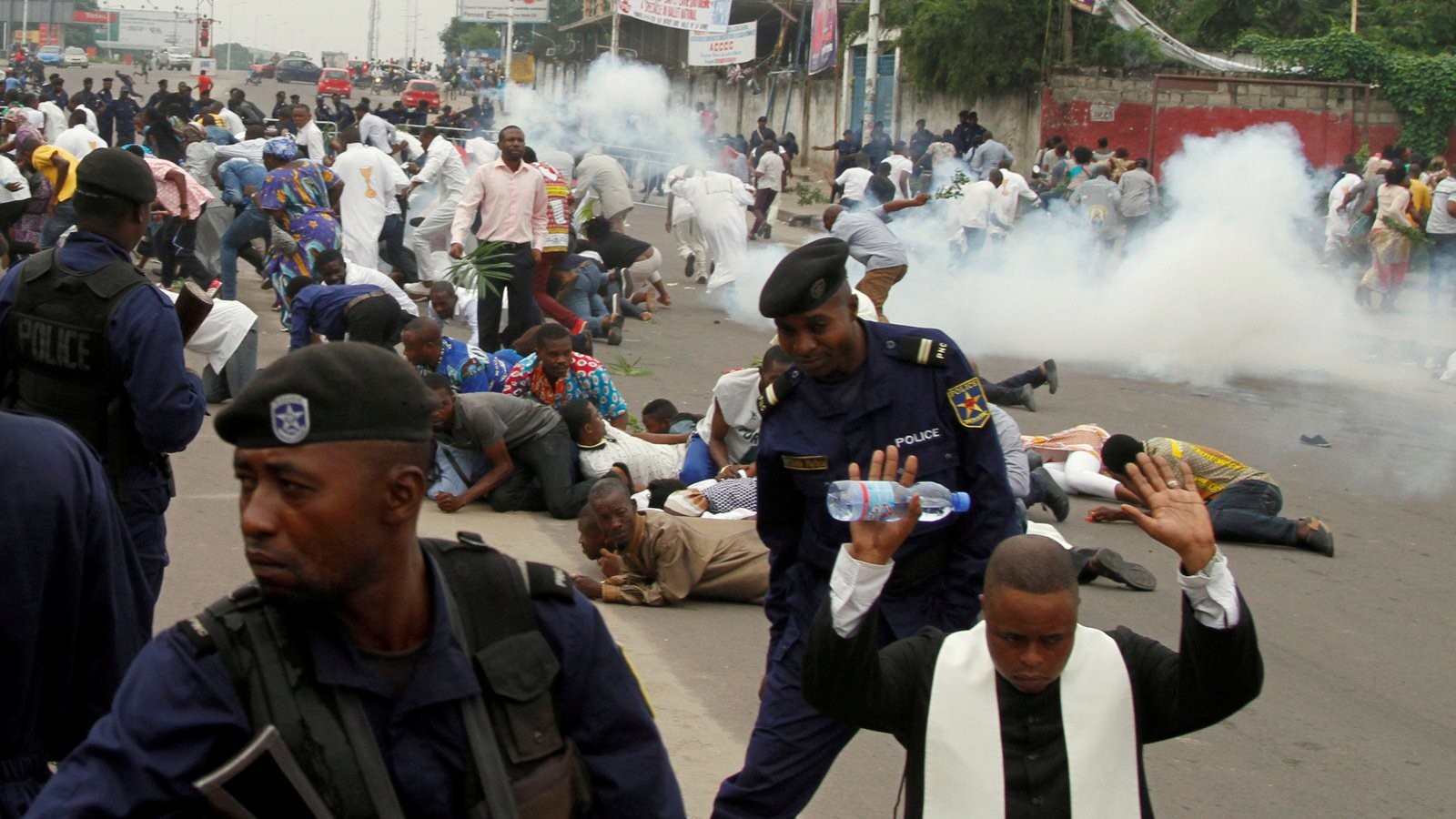
Последние полвека истории Демократической Республики Конго (ранее называвшейся Заир) переполнены кровью. Кровь, которая была пролита в гражданских войнах, а также в конфликтах с соседними странами, против частных армий иностранных бизнесменов или попытках сдержать насилие небольших групп бандитов, замаскированных под повстанцев. После свержения диктатора Мобуту была предпринята попытка восстановить демократию, закончившуюся, как видно на фото, убийством президента Лорана Кабилы (Laurent Kabila), бывшего лидера повстанцев, катапультировавшегося к власти благодаря сумме конъюнктурных совпадений, почти все из которых были вызваны вмешательством тех, кто заинтересован в разработке огромных залежей полезных ископаемых бывшего Заира.
Со времен Мобуту до сегодняшнего дня кажется, что все сильно изменилось – и зачастую насильственным образом. За исключением одного: человека, который за кулисами видел, как растет его власть, один переворот за другим, и, выше всего этого, человека, который его возглавляет, израильского бизнесмена. Речь идет об Эрике Монге Мумбе (Eric Monga Mumba) и Дэне Гертлере (Dan Gertler).
Африка требует совершенно нового человека: открытого, современного, элегантного человека, который среди эталонов выбрал западную модель и поэтому отказался от мусульманской и азиатской. Человек, который учился и который в своей профессии нашел в себе силы применить то, что он знает, не отказываясь от своих традиций, но не уступая эндемическим слабостям прошлого. Сильный человек, решительный, но не жестокий, который пробивался через ум и усердие, а не коррупцией и запугиванием.
Вы, наверное, никогда раньше не слышали это имя, но Эрик Монга Мумба выглядит примерно так. Он явно застенчивый, влиятельный и богатый человек, которого считают одним из «миллионеров Конго среди хаоса». Изображенный в первых сценах недавнего документального фильма, можно увидеть, как Монга пьёт «лучшее шампанское» и курит жирную сигару, когда он устраивает званый обед на крыше для друзей в честь закрытия крупной коммерческой сделки[1]. В документальном фильме Монга утверждает, что все, что вам нужно сделать, чтобы разбогатеть в Конго, – это много работать[2]. Это не работает для большинства конголезских граждан, которые живут менее чем на 1,90 доллара в день[3]. Но был ли именно «тяжелый труд» тем, что принесло ему его богатство и видное положение, которое он сейчас занимает в конголезских делах?
От Мобуту до Кабилы: история успеха амбициозного молодого человека
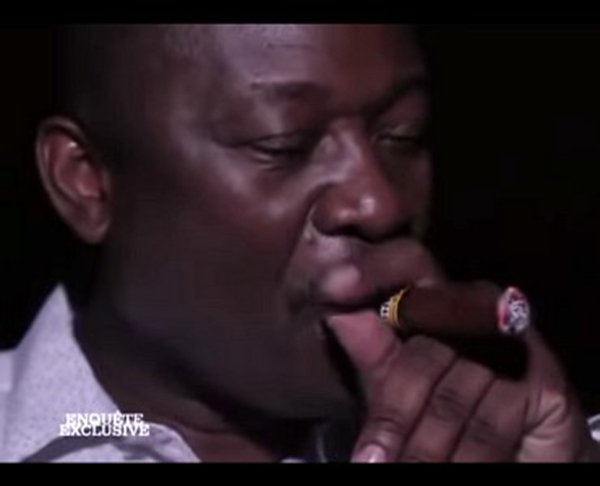
Эрик Монга Мумба празднует крупную победу, устроив для друзей роскошный ужин на крыше[4]
Эрик Монга Мумба родился в 1965 году в Лубумбаши (Lubumbashi)[5], столице провинции Верхняя Катанга. Лубумбаши – второй по величине город в ДРК после Киншасы. В том году конголезский кризис подходил к концу: в течение пяти лет жители Катанги активно стремились отделиться от остальной части Республики Конго[6]. Кризис в Конго в конечном итоге привел к убийству Патриса Лумумбы (Patrice Lumumba), первого премьер-министра Конго после обретения независимости[7].
Сообщается, что у Монги есть брат по имени Эди, врач из Италии[8]. Его отец Катанга Монга был описан как великий бизнесмен и один из первых, кто поддержал кустарную добычу полезных ископаемых в Катанге[9]. Он вырос под деспотическим правлением диктатора Мобуту Сесо Секо (Mobutu Seso Seko), «олицетворения африканского клептократа», под присмотром которого улицы Киншасы превратились в открытые канализации, заполненные голодающими людьми[10]. Что ж, Эрик смог вырасти в ту эпоху и стать кем-то совершенно другим: как все называют его сейчас, «боссом боссов Катанги»[11] (или «покровителем Катанги»[12]).
В начале 90-х, всего через несколько лет после получения степени в области экономики, Монга оказался на выгодной государственной должности в BCC Banque Centrale du Congo (центральный банк Конго)[13]. В BCC сначала Монга был заместителем руководителя Бюро исследований и обменов[14], затем он стал обладателем ценных бумаг в 1994 году, а с 1995 по 1997 год руководил службой банковского надзора[15]. Последние годы работы Монги в BCC прошли среди хаоса (и возможностей) Первой войны в Конго, которая закончилась в 1997 году после убийства Мобуту и прихода к власти Лорана-Дезире Кабила (Laurent-Désiré Kabila) с помощью соседних стран Руанды и Уганды[16].
В конце 90-х годов горнодобывающие активы ДРК были изношены и практически полностью разорены[17]. Они также полностью принадлежали государственной горнодобывающей компании Gécamines[18]. К сожалению, последовавшая за этим децентрализация активов не принесла пользы большинству жителей ДРК. Вместо этого «оптовая продажа природных ресурсов Конго» в пользу коррумпированной элиты началась в мае 1997 года, когда Лоран Кабила был приведен к присяге[19].
Срок Лорана Кабилы у руля земного корабля-ДРК был недолгой. Руанда и Уганда (которые когда-то поддерживали его кампанию) послали новую армию повстанцев, чтобы свергнуть его[20]. Когда он цеплялся за власть, началась Вторая конголезская война, унесшая более 5,4 миллиона жизней за десять лет[21]. В 2001 году Кабила-старший был убит одним из своих детей-солдат[22]. Его сын Иосиф (Joseph) занял его место, там где он остановился. Когда Кабила-младший вступил в должность через десять дней после смерти своего отца, его режим продолжал приватизировать горнодобывающие активы ДРК посредством коррупционных сделок, заключенных в интересах его ближайшего окружения и его самого[23].
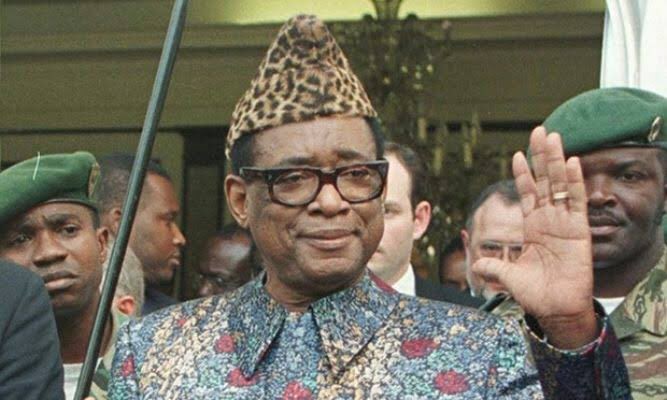
Кровожадный диктатор Мобуту Сесе Секо за несколько месяцев до своего свержения [24]
В 1998 году после ухода из BCC Эрик Монга был принят на работу в кабинет Огюстена Катумбы Мванке (Augustin Katumba Mwanke). Катумба был губернатором Катанги во время короткого и злополучного правления Лорана Кабилы. Его губернаторство закончилось в 2001 году, в год убийства Кабилы-старшего. Этот особенно бурный и раздираемый конфликтами период в конголезских делах Монга провел в качестве экономического советника губернатора стратегически важной провинции Катумба[25].
В ДРК элитные криминальные сети пронизывают экономику до такой степени, что разграбление государства Кабилой и его приспешниками часто имеет видимость законности[26]. Таким образом, коррупция в ДРК представляет собой «сложную ситуацию, когда серые субъекты действуют в основном в рамках законных институтов, но при этом предоставляют критически важные ресурсы для незаконной деятельности, включая добычу, переработку и торговлю минералами»[27]. В отчете Глобальной обсерватории транснациональных преступных сетей (Global Observatory of Transnational Criminal Networks) за 2017 год говорится, что существует «сотрудничество между частным и государственным секторами», которое поддерживает «ситуацию всеобщей коррупции, а также гуманитарной, социальной и политической нестабильности в Демократической Республике Конго и соседних странах»[28].
Если раньше различные армии с транснациональными связями контролировали доступ к ценным ресурсам, то теперь их заменили местные ополченцы и политики майи-майи[29]. В 2002 году Группа экспертов ООН отметила, что «грабежи, которые ранее проводились самими армиями, были заменены организованными системами хищения, налогового мошенничества, вымогательства, использования опционов на акции в качестве откатов и отвлечения государственных средств, проводимых группами, которые очень похожи на преступные организации»[30]. Эти преступные организации, которые действуют за завесой очевидной легитимности, состоят из «элитных сетей», которые действуют «посредством передовых механизмов государственной кооптации»[31]. По данным Группы экспертов ООН, те самые элитные сети, к которым принадлежал наставник Эрика Монги Катумба.
Чтобы проиллюстрировать масштаб этой системы, стоит отметить, что в декабре 2016 года, незадолго до истечения конституционного мандата Кабилы, пятнадцать ближайших членов семьи Кабилы владели более чем 70 компаниями, согласно расследованию Bloomberg, касающемуся деловых интересов семьи[32]. Их интересы охватывают экономику в различных отраслях, таких как горнодобывающая промышленность, банковское дело, логистика, сельское хозяйство, гостиничный бизнес и топливо[33]. Сестра-близнец Кабилы Джейнет (Jaynet), имя которой ассоциируется со многими компаниями, была названа в результате масштабной утечки офшорных данных в 2016 году – Panama Papers[34]. Однако точную стоимость активов семьи Кабила установить сложно, поскольку экономика ДРК остается в высшей степени неформальной и основанной на наличных деньгах[35].
Августин Катумба Мванке: соединитель и наставник
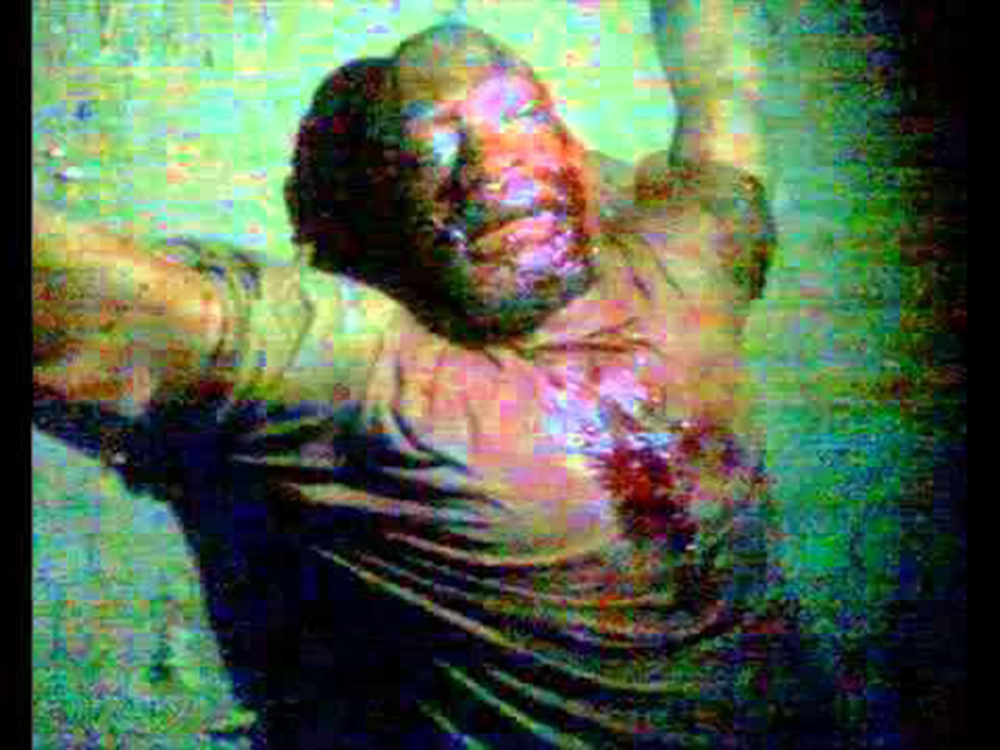
Убитое тело Лорана Дезире Кабилы [36]
В 2015 году обширная Катанга была разделена на четыре административные провинции: Танганьика, Верхнее Ломами, Луалаба и Верхняя Катанга[37]. Это также сердце семьи Кабила[38] и родная провинция Лорана Кабилы[39] и Катумбы Мванке[40]. В течение трех лет после обретения ДРК независимости от Бельгии в 1960 году Катанга была отколовшейся территорией[41]. Дух сецессии в этом регионе витает и по сей день. Восточная Катанга богата полезными ископаемыми, поставляя кобальт, медь, олово, радий, уран и алмазы на международные рынки[42]. Грузовики грохочут по улицам Лубумбаши днем и ночью, направляясь к границе с Замбией, а затем дальше в Азию[43].
Власти провинции Катанга «хвастаются своими либеральными правилами добычи полезных ископаемых»[44]. В провинции огромные запасы кобальта и месторождения высококачественной меди[45]. За десять лет, предшествовавших 2008 году, цены на медь сильно выросли, и Катанга пережила «впечатляющий экономический бум»[46]. Однако большая часть выгод не дошла до населения в целом, а эйфория бума скрывала «многие угрозы, как экономические, так и экологические»[47]. Центральное правительство не спешит выплачивать Катанге свою долю средств, генерируемых экономикой Катангайса, якобы из опасения, что, если регион экономически превзойдет остальную часть страны, отделение может стать более вероятным[48].
Несомненно, «модели политического вмешательства, коррупции и разграбления природных ресурсов нынешним и предыдущими правительствами» являются ключевой чертой в динамике Катанга-Киншаса[49]. Коррупция укоренилась в регионе и определяет отношения провинций с центром власти в Киншасе. В Катанге компаниям сходит с рук неуплата налогов, если они принадлежат различным влиятельным лицам[50].
В 2006 году в отчете Global Witness задокументирована безжалостная эксплуатация горняков правительством и торговыми компаниями в секторе кустарной добычи Катанги[51] и исследована роль политических субъектов в коррупции, связанной с горнодобывающей промышленностью, в провинции Катанга[52]. На местном уровне интервью, проведенные Global Witness в 2006 году, показали, что политики Катангайса получают долю от сделок по добыче полезных ископаемых[53] и что невозможно работать без «политического зонтика» – свободы деятельности, приобретаемой за счет регулярных крупных денежных выплат Кабиле и его ближайшему окружению[54]. Эта система действует как на промышленном, так и на неформальном уровнях добычи полезных ископаемых, облегчая систему незаконного вывоза[55].
Эрик Монга был экономическим советником Августина Катумбы Мванке, который был губернатором Катанги с 1998 по 2001 год[56]. Однако важно отметить, что Катумба был намного больше, чем губернатором провинции, он также был ключевым помощником для обоих Кабил. Катумба дружил с Лораном Кабилой[57] и впоследствии стал ближайшим советником Джозефа Кабилы[58] и, следовательно, одним из самых влиятельных людей в правительстве ДРК.
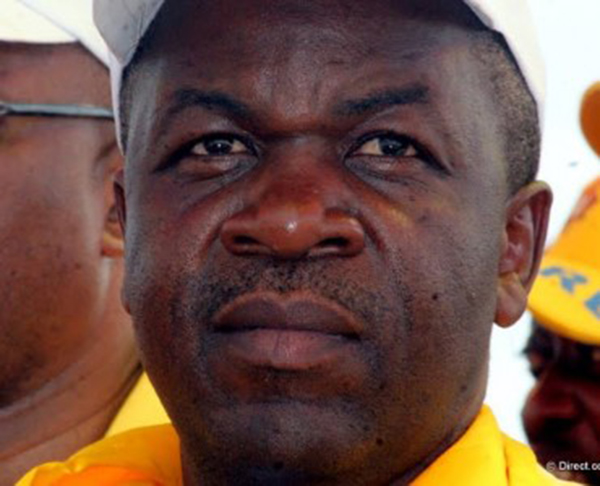
Augustin Katumba Mwanke[59]
Просочившаяся телеграмма посла США Уильяма Дж. Гарвелинка (William J Garvelink) описала Катумбу как человека, известного своей деловой хваткой[60]. В телеграмме говорилось, что у Катумбы сохраняются проблемы со здоровьем, и отмечалось, что некоторые наблюдатели считали его ВИЧ-инфицированным[61]. Его считали «сомнительным» и «гнусным» членом ближайшего окружения Кабилы[62]. Он жил в Южной Африке до смерти Мобуту[63], где, по всей видимости, работал в горнодобывающей компании[64]. Он был бывшим главой Альянса за президентское большинство (AMP – Alliance for the Presidential Majority)[65]. Возможно, самое главное, Катумба был очень близким другом израильского миллиардера Дэна Гертлера и, как полагают, управлял личным состоянием Кабилы[66].
Катумба также была широко известен как «центральное звено в контрактах на добычу полезных ископаемых»[67]. С 2001 по 2004 год, вскоре после того, как его губернаторство закончилось, Катумба стал директором конголезского филиала канадской транснациональной компании Anvil Mining[68]. Считается, что Катумба сыграла ключевую роль в заключении контракта на добычу полезных ископаемых Anvil в Катанге[69]: генеральный директор Билл Тернер (Bill Turner) признал в телеинтервью, что Anvil заплатила Катумбе «гонорары директора» и что Anvil арендовала его собственность в Лубумбаши почти за 4000 долларов в месяц[70]. Компания Anvil Mining получила международную известность в 2004 году, когда она оказалась втянутой в трагическую бойню в Килве[71]. Отношения Катумбы с Anvil демонстрируют его ключевое положение в крупных сделках по добыче полезных ископаемых.
В заключительном отчете Группы ООН по незаконной эксплуатации природных ресурсов и других форм богатства за 2002 год в ДРК Катумба считался «ключевым влиятельным брокером в горнодобывающих и дипломатических сделках»[72]. Что еще более тревожно, Группа ООН считала босса Монга одной из главных фигур в элитной сети «политических, военных и коммерческих интересов, [которая] стремится сохранить контроль над основными минеральными ресурсами… территории, контролируемой Правительством [ДРК]»[73]. В отчете говорится, что элитная сеть, в которую входил Катумба, «передала в собственность активы на сумму не менее 5 миллиардов долларов США из государственного горнодобывающего сектора под контроль его частным компаниям» в течение трех предыдущих лет «без компенсации или выгоды для Государственной казны»[74].
В докладе описывается «сложная и ухудшающаяся ситуация, в которой преступные сети созданы политическими лидерами, государственными служащими, горнодобывающими компаниями и преступниками, такими как ополченцы, военизированные группы и торговцы оружием»[75]. Группа внесла Катумбу в свой список лиц, которым, по ее мнению, следует заморозить активы, запретить поездки и запретить банковское дело[76]. В одном из отчетов говорится, что он «играл ключевую роль в незаконном обороте полезных ископаемых» в ДРК, когда в 2002 году занимал пост министра государственного портфеля[77]. Эта должность давала Катумбе власть над лицензиями на добычу полезных ископаемых в ДРК даже после того, как его срок пребывания у власти закончился[78]. Один бывший конголезский министр заметил, что, когда Кабила назначил Катумбу министром, это положило начало целой «системе грабежа»[79].
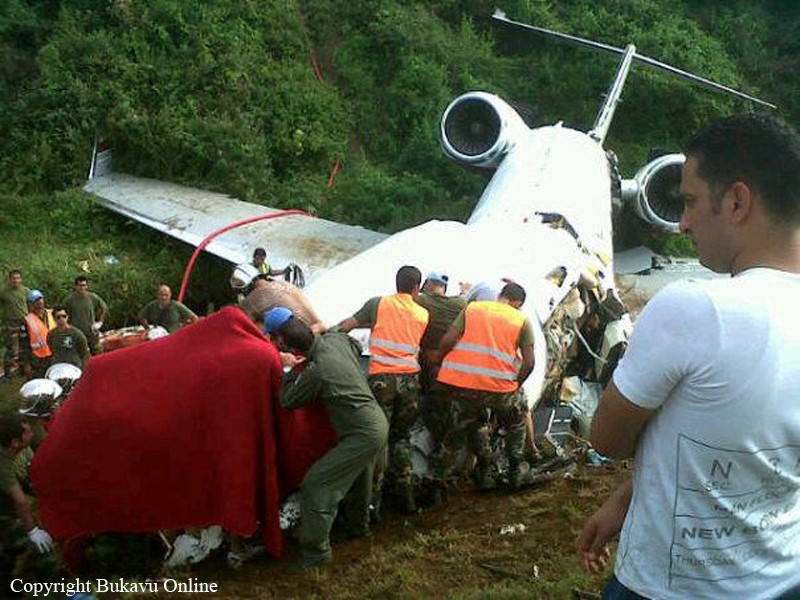
12 февраля 2012 г .: Gulfstream GIV с Катумбой на борту не приземлился в Букаву, не попал на взлетно-посадочную полосу и врезался в насыпь, разбившись надвое и погибли пассажиры[80]
После того, как доклад ООН был опубликован, Катумба продолжал занимать руководящие должности: Кабила отстранил его от власти менее чем на год, после чего он вернулся на пост генерального секретаря Народной партии реконструкции и развития Кабилы (PPRD)[81]. Впоследствии он выступал в качестве «странствующего посла» Кабилы, участвуя в мирных соглашениях в Сан-Сити (которые привели к формированию переходного правительства Кабилы), а в 2006 году он был избран в Национальную ассамблею ДРК[82]. Катумба, как ближайший советник Кабилы, явно действовал безнаказанно.
После того, как пыль осела в отчете ООН и Катумба прочно вернулся в центр власти, обвинения против него продолжали появляться. В своем отчете за 2006 год Global Witness описала инцидент, связанный с контактом Катумбы, который произошел в октябре 2005 года[83]. Торговец-посредник, участвовавший в сокрытии попытки кражи партии полезных ископаемых, имел тесные связи с Катумбой и родственниками Кабилы[84]. Губернатор Катанги (в то время Урбайн Кисула Нгой (Urbain Kisula Ngoy) указал, что со стороны его иерархии было давление, чтобы пропустить товары[85]. Августин Катумба Мванке внезапно погиб в авиакатастрофе вместе со своим вторым пилотом в феврале 2012 года[86], как сообщается, после того, как сказал своему близкому другу, что опасается за свою жизнь[87].
Рождение и рост Trade Service
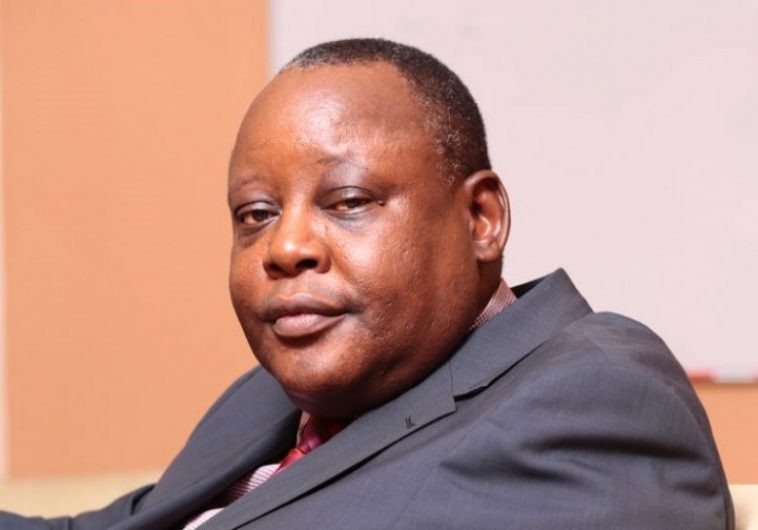
Гай Кименьембо (Guy Kimenyembo), генеральный директор Trade Service и – в то же время, провинциальный президент корпорации таможенных экспедиторов в FEC Katanga и член исполнительного комитета FCFASA (Федерация таможенных брокеров и экспедиторов Южной Африки)[88]
Когда губернаторство Катумбы закончилось в 2001 году, то же самое произошло и с официальной государственной карьерой Эрика Монги. Он стал агентом шахт и карьеров[89] и основал компанию под названием Trade Service в Лубумбаши[90]: консалтинговое агентство по исследованиям, налогообложению и упрощению формальностей с более чем 100 сотрудниками[91] и довольно скоро репутацию центра коррупции в горнодобывающем секторе Конго[92]. Компания была основана Монгой и тремя другими партнерами[93]: Клодом Мутомбом (Claude Mutomb) (покойным), Гаем Кименьембо (Guy Kimenyembo) и Эриком Кабилой[94]. Присутствие Кименьембо является явным нарушением правил конфликта интересов, поскольку он является самым влиятельным человеком, контролирующим таможню Катанги и пограничные посты с соседними странами[95].
Эрик Кабила заслуживает дальнейшего рассмотрения. Его отец является акционером Trust Merchant Bank[96]. По данным французского Le Monde Diplomatique, как и Монга, Эрик Кабила также является бывшим должностным лицом BCC[97]. Он еще один агент шахт и карьеров[98]. Сюда входит консультирование по налоговым вопросам, получение титулов, взаимодействие с правительством и организация перевозок[99].
Интересно, что он и Эрик Монга указаны как единственные два контактных лица в офисах компании Trans-Med Shipping в Лубумбаши, Киншасе и Матади[100]. Самое главное, Эрик Кабила был близок с Катумбой Мванке[101]. Он якобы заработал состояние после разорения Gécamines, помогая крупным компаниям после принятия нового закона о добыче полезных ископаемых[102]. Он определенно занимает высокое положение в высшем конголезском обществе – он был сфотографирован со своей семьей на роскошном собрании конного общества Лубумбаши в Гранд-отеле Karavia в 2016 году, организованном горнодобывающим магнатом Джорджем Форрестом (George Forrest)[103].
В 2008 году Эрик Монга основал La Société de Surveillance Minière в Ликаси, аналитическую лабораторию, которая якобы уделяет внимание трудоустройству бывших руководителей Gécamines и выпускников Университета Лубумбаши в горнодобывающем секторе ДРК[104]. Кроме того, в 2012 году Монга создал компанию DRC Mining Consulting Services (DRCMCS), зарегистрированную в Нью-Йорке, генеральным директором которой он является[105]. DRCMCS – это независимая консалтинговая компания в горнодобывающей промышленности, предлагающая международным участникам горнодобывающей промышленности ряд услуг, связанных с разработкой сырья из ДРК[106].
Его крупная победа пришла к нему в 2013 году, когда Монга был избран президентом подразделения Катанги Федерации конголезских предпринимателей (FEC), крупнейшей группы лоббирования бизнеса ДРК[107]. Эту роль иногда называют Президентом Катангаи[108]. Патрик Муланд Кабей (Patrick Muland Kabey) и Жан Кундурис (Jean Coundouris) были избраны его заместителями[109]. Компания Монги La Société de Surveillance Minière была назначена председателем региональной комиссии по шахтам, а Trade Service стала председателем по услугам, производству и энергетике вместе с компаниями Muland и Coundouris, Mulykap и Hyper-Psaro соответственно[110].
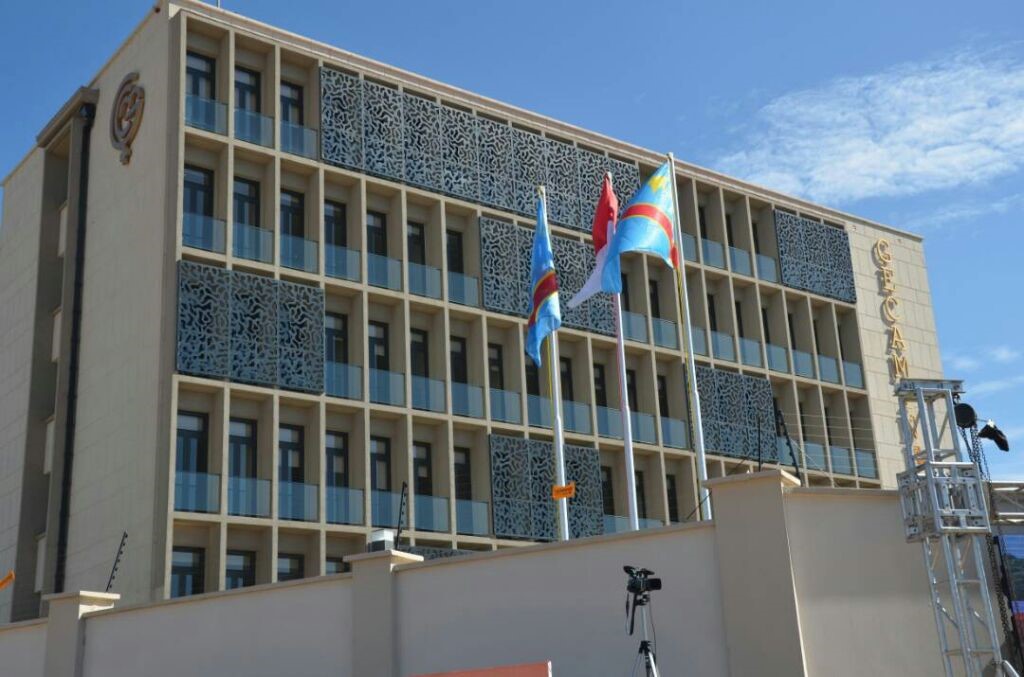
Здание, резиденция Жекамин, в Лубумбаши [111]
В 2013 году, когда он выполнял обязанности президента Федеральной избирательной комиссии (FEC), Монга был обвинен в препятствовании расследованию таможенного мошенничества в Катанге: расследование было заказано прокуратурой и проводилось группой во главе с тогдашним генеральным прокурором Саймоном Ньянду Шабанду (Simon Nyandu Shabandu)[112]. В ходе расследования Ньянду было рассмотрено 25 дел о предполагаемых нарушениях таможенных правил и коррупции в Таможенно-акцизном агентстве (DGDA) в Лубумбаши, Катанга[113]. Однако это было менее 10% от числа дел, подлежащих рассмотрению[114], поскольку уголовное расследование было приостановлено[115]. Отчет о расследовании в Ньянду так и не был официально опубликован, но он просочился и был рассмотрен Рейтерс (Reuters)[116], и был опубликован на французском языке и переведен на английский язык Африканской сетью веры и справедливости (Africa Faith and Justice Network)[117].
Отчет пролил свет на коррупцию среди сотрудников таможни DGDA в Катанге, которые вступали в сговор с компаниями, которые якобы недооценивали свой импорт и экспорт и вообще уклонялись от уплаты налогов[118]. Некоторых таможенников обвинили в уничтожении доказательств уклонения от уплаты налогов[119]. Просочившийся отчет показал, что 11 компаний несут ответственность за невыплаченные налоги и штрафы на общую сумму около 741 млн долларов[120]. Было замечено, что если бы оставшиеся 90% дел, заказанных прокуратурой, действительно были рассмотрены, то вполне вероятно, что были бы обнаружены еще миллиарды долларов средств, потерянных в результате коррупции и мошенничества[121].
Одной из компаний, названных в связи с неуплатой налогов, была компания Эрика Монга – Trade Service[122]. Более того, в отчете Nyandu конкретно упоминается Эрик Монга, который пытался воспрепятствовать ходу расследования: «В то время как некоторые преступники, такие как COMEXAS, AACC и другие, продемонстрировали свою добрую волю заплатить права DGDA, другие, наоборот, пытались воспользоваться FEC Katanga с помощью своего президента, некоего Эрика Монга, который объединился и использовал канал местной прессы, чтобы подстрекать людей к забастовке или даже спровоцировать восстание против миссии»[123].
Следователи установили, что имело место «неуважение бизнесменов по отношению к таможенной администрации»[124]. Это в сочетании с «безразличием агентов DGDA» означало «чрезмерную безнаказанность» за коррупцию в провинции[125]. Авторы отчета придерживались мнения, что «отсутствие готовности и желания некоторых бизнесменов предоставить доказательства» свидетельствует об их вине[126]. Еще одним открытием комиссии стало участие еще одного влиятельного конголезского деятеля, тесно связанного с Эриком Монгой – президента Gécamines[127], президента FEC (в котором Монга является президентом Катанги)[128], председателя комитета по аудиту BCC[129] и личного друг семьи Кабила[130]: Альберта Юма.
Альберт Юма Мулимби (Albert Yuma Mulimbi)
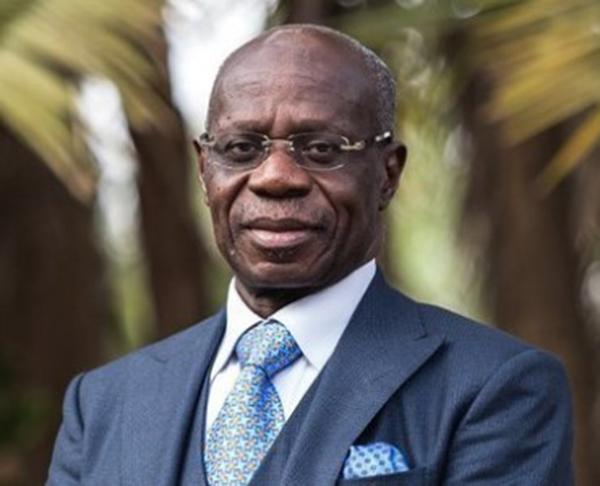
Albert Yuma Mulimbi[131]
После результатов выборов 2018 года в ДРК и его первой демократической передачи власти после обретения независимости, Кабила (и его Общий фронт Конго) и Феликс Чисекеди (Felix Tshisekedi) (и его коалиция CACH) официально правят вместе. Однако, по сообщениям прессы, «Кабила не намерен отказываться от власти»[132]. Ходили разговоры о том, что Юма станет премьер-министром нового правительства с разделением власти, но в конечном итоге он был отклонен как кандидат президентом Феликсом Чисекеди[133].
В 2019 году Юма, в качестве президента Gécamines, оказался в центре сложного кредитного спора с Дэном Гертлером, который обострился до такого уровня, что 17 декабря 2019 года Юме было запрещено покидать Киншасу, пока прокуратура изучала спор[134]. «Независимый источник, близкий к делу», заметил в начале 2020 года, что спор связан с «реальной борьбой за власть между воротилами старого режима и нынешним президентом»[135]. Чисекеди даже выступил с заявлением по поводу спора по национальному телевидению, призвав суды «делать свою работу»[136].
В октябре 2017 года компания Fleurette Mumi Holdings Ltd, принадлежащая Дэну Гертлеру, предоставила Gécamines ссуду на 200 миллионов евро[137]. Из согласованной суммы 128 миллионов евро были фактически переведены Gécamines[138]. Срок погашения кредита в размере 128 млн евро наступил в апреле 2018 года, однако к этому времени Дэн Гертлер попал под санкции США[139]. Gécamines (которой руководил Юма) утверждала, что не может выплатить ссуду, не рискуя сама подвергнуться санкциям[140]. Тем временем Fluerette Mumi Ltd передала право собственности на долг другой компании, принадлежащей Дэну Гертлеру, Ventora Development Sasu, которая начала разбирательство по взысканию ссуды в конголезских судах[141]. Хозяйственный суд Лубумбаши вынес решение в пользу Ventora 14 ноября 2019 года, но Gécamines отказывается платить и подает апелляцию[142].
Тем не менее, в то время как Чисекеди повторно назначил Юму президентом Gécamines в новом правительстве[143], Сама Луконде (Sama Lukonde), близкий к Чисекеди, стал генеральным менеджером[144]. Lukonde попросил обнародовать некоторые контракты Gécamines, включая передачу в 2017 году прав Gécamines по сбору роялти от проекта Metalkol компании Gertler[145]. Хотя у Юмы и Гертлера могут возникать разногласия по поводу кредитного спора, по словам политолога и активиста Мпуту, он выступает против потенциальной проверки сделок Гекамина с израильским бизнесменом Дэном Гертлером[146].
Кто, черт возьми, такой Дэн Гертлер?
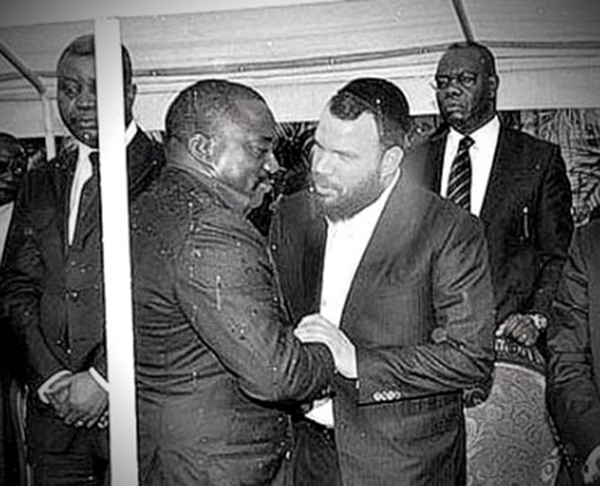
Joseph Kabila, (в центре слева) и Dan Gertler (в центре справа)[147]
По крайней мере, один член элитной криминальной сети ДРК был предметом пристального внимания международного сообщества – Дэн Гертлер[148], своего рода «солдат удачи»[149], который начал свою карьеру, торгуя алмазами в Анголе, которая была в разгаре гражданской войны[150]. Еще во времена президентства Лорана Кабилы раввин познакомил Гертлера со своим сыном Жозефом, который в то время был главой конголезской армии[151]. Гертлер и Джозеф мгновенно стали друзьями[152].
В какой-то момент Гертлера познакомили с отцом Джозефа, Лораном, и он стал центральным в его попытках сохранить власть после того, как Руанда и Уганда отвернулись от него[153]. Согласно отчету ООН, двое мужчин заключили сделку – Гертлер должен был предоставить президенту 20 миллионов долларов и доступ к «израильской военной технике» в обмен на монополию на все алмазы ДРК[154]. После убийства Кабилы-старшего Гертлер сыграл ключевую роль в новом режиме, и его близкий друг Джозеф даже послал его в качестве эмиссара на мирных переговорах[155].
По данным Министерства финансов США, миллиардер Гертлер «накопил свое состояние на непрозрачных и коррумпированных сделках по добыче ископаемых и нефти в Демократической Республике Конго на сотни миллионов долларов»[156]. Казначейство США обвинило Гертлера в использовании его дружбы с Кабилой для того, чтобы действовать в качестве посредника при продаже по заниженной цене горнодобывающих активов в ДРК, и отметило, что Гертлер «действовал от имени Кабилы, помогая Кабиле организовать оффшорные лизинговые компании»[157]. Его сеть активов в ДРК принадлежит примерно пятидесяти компаниям, зарегистрированным в налоговых убежищах, и включает контракты в медной, кобальтовой, алмазной и нефтяной отраслях[158].
В декабре 2017 года Гертлер и двадцать его компаний стали объектами санкций США[159]. Казначейство США обвинило Гертлера в использовании «своих отношений с главой конголезского государства в качестве посредника при продаже горнодобывающих активов в Демократической Республике Конго, вынуждая транснациональные компании через Гертлера вести дела с конголезским государством»[160]. По их оценкам, только в период с 2010 по 2012 год ДРК потеряла невероятные 1,36 миллиарда долларов из-за продажи недооцененных активов офшорным компаниям Гертлера[161].
Одна только сделка в 2015 году привела к потере 149,5 млн долларов потенциального дохода ДРК. В дополнение к убыткам в 1,36 миллиарда долларов, отсутствие прозрачности правительства в сделках по добыче полезных ископаемых с Гертлером привело к тому, что МВФ отменил запланированные ссуды ДРК на общую сумму 225 миллионов долларов[162]. Уходящая администрация Трампа поддалась лоббистскому давлению и использовала свои последние дни, чтобы ослабить санкции, введенные в отношении Гертлера в 2017 году[163], но впоследствии санкции были восстановлены президентом Байденом[164].
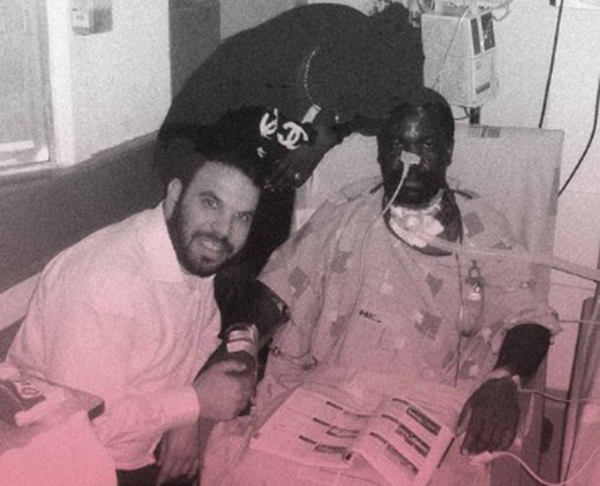
Dan Gertler (слева) у кровати Augustin Katumba Mwanke в больнице[165]
Благодаря своей дружбе с Кабилой и его ближайшим окружением Гертлер приобретает недооцененные горнодобывающие активы, а затем перепродает их по рыночным ценам с огромной прибылью. Этот способ действий был описан как переворот активов: «Определенный горнодобывающий актив ДРК (скажем, ABC) продается оффшорной компании, которая затем продает его – так называемый «переворот» – с огромной прибылью другой организации. Затем новый владелец привлекает деньги на западных рынках и заново развивает ABC как законный горнодобывающий актив. Эти сделки проводятся организациями, зарегистрированными в налоговых убежищах или связанными с ними, такими как Британские Виргинские острова»[166].
Гертлер использовал эту стратегию переворота активов в отношении Global Enterprises Corporate (GEC), позже переименованной в Nikanor[167]. GEC была основана в марте 2005 года компанией Гертлера Dan Gertler International (DGI) вместе с другим израильским тяжеловесом: Бенджамином Штайнметцем (Benjamin Steinmetz)[168]. Бывший министр шахт ДРК Саймон Тума-Ваку (Simon Tuma-Waku) выступил в качестве специального советника[169]. Совместное предприятие было создано между GEC и Gécamines для повторной разработки огромного разрушенного рудника, состоящего из нескольких рудных тел, известного под аббревиатурой KOV[170].
Комиссия Лутундулы, комиссия Национального собрания ДРК, которая в июне 2005 года сообщила о своем расследовании незаконной эксплуатации в горнодобывающей промышленности и «законности заключенных сделок» участниками конфликтов в ДРК[171], рекомендовала прекратить переговоры по KOV[172]. Несмотря на это, в октябре 2003 года указом президента было ратифицировано соглашение KOV между GEC и Gécamines[173].
Гертлер заплатил 3 миллиона долларов за активы KOV, которые в конечном итоге достигли рыночной стоимости более 1 миллиарда долларов после ряда размещений акций[174]. Это колоссальное повышение цен иллюстрирует то, что правительство и народ ДРК потеряли из-за этих особых отношений между Гертлером, Кабилой и членами ближайшего окружения Кабилы: правительство ДРК было полностью замешано в этой системе грабежа[175].
В отчетах 2010 года было обнаружено, что права First Quantum на медный проект Kingamyambo Musonoi Tailings (KMT) стоимостью 750 миллионов долларов были переданы Highwind Properties, «загадочной»[176] компании, зарегистрированной на Британских Виргинских островах, с «теневыми представителями»[177]. DRC создала новое совместное предприятие под названием Metalkol Sarl для контроля над компанией KMT, 30% которой принадлежало Gécamines, а 70% – Highwind Properties[178]. В конечном итоге Highwind Properties оказалась еще одной компанией, принадлежащей Гертлеру[179].
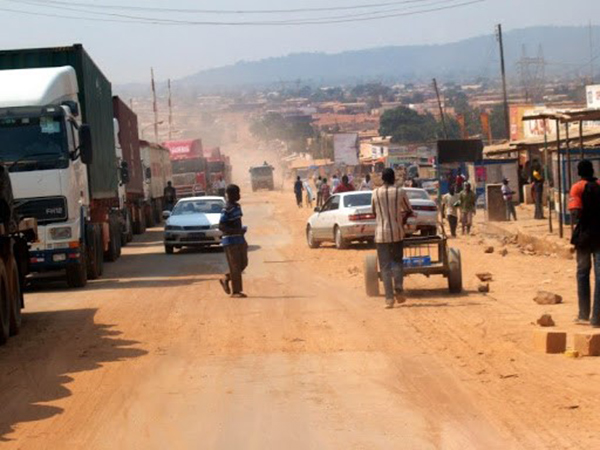
Таможня Касумбалеса между Катангой и Замбией, в течение многих лет контролируемая Эриком Монгой Мумбой и его торговой службой [180]
Гертлер заплатил за KMT 60 миллионов долларов[181], но продал его теневому казахстанскому горнодобывающему гиганту ENRC почти за 700 миллионов долларов[182]. First Quantum утверждала, что построила большую часть завода по переработке меди стоимостью 550 миллионов долларов в KMT, когда права были переданы Highwind Properties[183] и подали в суд[184]. Возможно, неудивительно, что суд ДРК постановил, что First Quantum больше не владеет правом собственности на проект, и оштрафовал его на 12 миллиардов долларов в качестве возмещения ущерба[185]. Кого Апелляционный суд назначил ликвидатором активов компании First Quantum KMT? Неудивительно: Эрика Монга[186].
В ноябре 2020 года Дэн Гертлер организовал пресс-конференцию в Киншасе[187]. Это было нехарактерно для Гертлера, которого всегда называли «крайне сдержанным»[188]. В то время против него в полной мере применялись санкции США, включая арест его активов и банковских счетов в США[189].
Гертлер, однако, не явился лично[190]: вместо этого присутствующим журналистам показали записанное видеообращение[191]. Согласно The Africa Report, Гертлер «торжественно объявил» о намерении «поделиться со своими конголезскими братьями» выгодами своих успехов в горнодобывающем секторе ДРК[192]. Никаких подробностей[193]. Согласно CNPAV, гражданской платформе ДРК, пресс-конференция была организована, чтобы отвлечь внимание общественности от разоблачений о передаче лицензионных отчислений Metalkol в 2017 году Гертлеру, упомянутом выше[194].
Все больше и больше скандалов
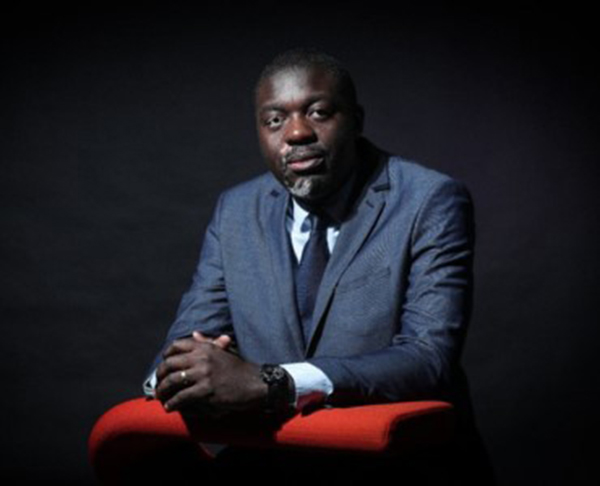
Jean–Jacques Lumumba[195]
День за днем скандалов вокруг Gécamines и конголезского горнодобывающего сектора становится все больше и больше. Далее следует упомянуть Lumumba Papers, собрание утекших внутренних документов из BGFIBank, которые раскрывают финансовые нарушения между BGFI, Национальной независимой избирательной комиссией, Центральным банком и несколькими компаниями из ближайшего окружения Кабилы[196]. Документы были проанализированы Платформой защиты информаторов в Африке (PPLAAF – Platform to Protect Whistle-blowers in Africa) и Проектом по освещению организованной преступности и коррупции (OCCRP – Organized Crime and Corruption Reporting Project) и широко освещались в прессе.
BGFIBank управляется родственниками Кабилы[197] и совладельцем является его сестра Глория Мтею (Gloria Mteyu)[198]. Информатор Жан-Жак Лумумба (Jean-Jacques Lumumba), племянник покойного первого президента Патриса Лумумбы (Patrice Lumumba), был одним из руководителей BGFIBank[199]: когда он выразил обеспокоенность по поводу финансовых нарушений своему начальству в банке, Фрэнсису Селемани Мтвале (Francis Selemani Mtwale) (приемный брат президента Кабилы и управляющий директор банка) угрожал ему огнестрельным оружием[200]. В конце концов он бежал из страны со своей семьей, взяв с собой тайник компрометирующих документов. Документы выявили четыре платежа[201] в размере 42,9 миллиона долларов без обеспечения от Центрального банка BCC на банковский счет компании EGAL Entreprise Générale d’Alimentation et de Logistique[202].
EGAL была официально зарегистрирована 12 октября 2013 года со статусом освобожденной от уплаты налогов, но якобы компания была финансово активна в течение трех месяцев до этой даты[203]. Согласно годовому отчету, рассмотренному PPLAAF, в 2014 году EGAL получила значительное снижение налогов[204]. Согласно финансовому отчету EGAL за 2014 год, в то время его акциями владели Эрик Монга, Альберт Юма Мулимби, а также конголезские компании Texico (которые возглавляет Юма)[205] и Aremad[206]. В совет директоров вошли Эрик Монга, Альберт Юма Мулимби, бельгиец Марк Пьедбёф (Marc Piedboeuf) и конголезец Ален Ван (Alain Wan), которые также входят в ближайшее окружение Кабилы[207]. Было высказано предположение, что Монга больше не занимает должности в EGAL после того, как он поссорился с братом Кабилы[208].
EGAL была создана под предлогом поставки дешевой импортной еды во многие недоедающие общины ДРК[209]. Вместо этого, похоже, что он действовал как воронка для перевода государственных средств в офшорные компании для конечной выгоды Кабилы и его соратников[210]. Информатор Лумумба сообщил OCCRP, что помимо передачи денег частным компаниям, связанным с ближайшим окружением Кабилы, заем BCC в размере 42,9 миллиона долларов выступал в качестве залога для дополнительной ссуды в размере 41 миллиона долларов от BGFIBank[211]. Транзакцию можно увидеть в утекших банковских записях[212]. Лумумба считал ссуду в большей степени «грантом», поскольку он не получил значительных выплат, когда он покинул банк и сбежал в Бельгию[213]. Сообщается, что у EGAL нет других доходов, кроме кредитов, предоставленных BCC и BGFIBank[214].
Выплаты из BCC в размере 42,9 миллиона долларов вызывают множество тревог. Во-первых, Центральный банк Конго (BCC) не имеет полномочий переводить деньги частным компаниям[215], что является нормой для центральных банков[216]. Во-вторых, на момент выдачи займов Альберт Юма Мулимби был одновременно директором и председателем комитета по аудиту Центрального банка[217], а также акционером и директором займа EGAL[218]. Если отбросить незаконность платежей в сторону, позиция Юмы представляет собой колоссальный конфликт интересов. Юма отрицал, что Центральный банк отправлял деньги EGAL, но банковские записи, проверенные OCCRP и PLAAF, показывают обратное[219]. В-третьих, совет директоров EGAL полностью состоял из ближайшего окружения (тогдашнего президента) Кабилы[220].
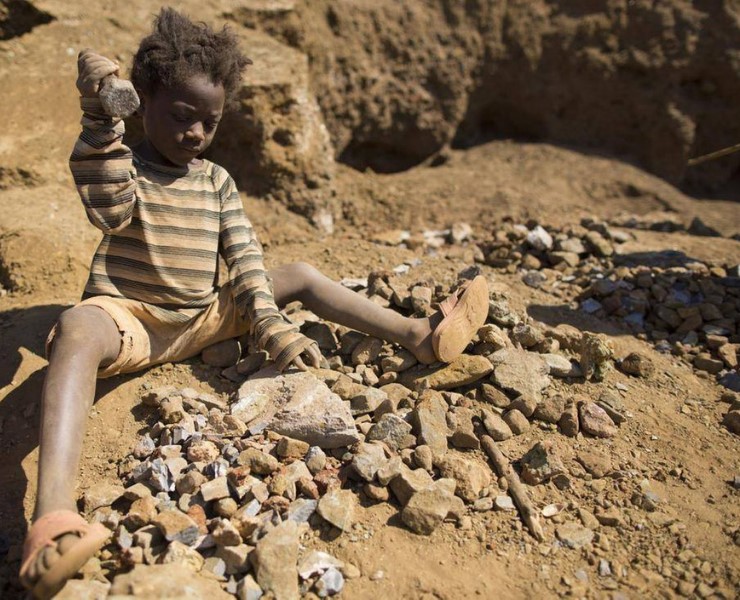
Девочка разбивает камни на заброшенном государственном медном руднике в городе Кипуши в Демократической Республике Конго[221]
Le Monde описал «друзей детства» Вана и Пьедбёфа как управляющих как сельскохозяйственными инвестициями Кабилы, так и фермами[222]. Пьедбёф одновременно является директором EGAL и администратором компании Ferme Espoir Кабилы[223]. Ван является директором EGAL и MW Afritec, имя которой недавно было упомянуто в другой утечке документов от разоблачителей: Banana Port Papers[224]. Сообщается, что в 2010 году Ван и Пьедбёф продали Кабиле La Société des Grands Elevages du Congo (GEL), которому принадлежит остров Матеба[225]. Пьедбёф является управляющим директором GEL[226].
Значительная часть ссуды BCC в размере $ 42,9 млн была затем переведена от EGAL иностранным компаниям, также управляемыми Piedboeuf и Wan[227]. Большую часть средств получили компании Samaki (Pty) Ltd в Намибии, All Ocean Logistics на островах Ферир и African Trading and Maintenance в Гонконге[228]. Банковские документы, проверенные OCCRP, показывают, что большая часть полученных средств была направлена этим трем компаниям, в общей сложности почти 38 миллионов долларов[229]. Затем эти компании участвовали в закупке и транспортировке диких животных, которые были доставлены в заповедники, принадлежащие компании Кабилы Ferme Espoir[230], включая заповедник Кингакати и остров Матеба[231]. Это предполагает (по крайней мере), что средства BCC были растрачены для покупки экзотических домашних животных для Кабилы, и что компания Монги EGAL действовала как воронка.
В период с июня 2013 года по июнь 2014 года компания African Trading Maintenance and Development, Гонконг, получила 20 переводов от EGAL на общую сумму 9,97 миллиона долларов[232]. Самаки, Намибия, получил переводы от EGAL на общую сумму 22,8 млн долларов, включая самый крупный разовый перевод в размере 11,5 млн долларов в августе 2013 года[233]. Сообщается, что эта намибийская компания, получившая большую часть средств Центрального банка, направляемых через EGAL, имеет почти идентичный EGAL совет директоров, состоящий из ближайшего окружения Кабилы[234]. Сюда входят Пьедбёф, Ван, Юма[235] и Эрик Монга[236]. OCCRP пояснил, что Самаки управляется политически влиятельной намибийкой Мартой Намундиебо-Тилахун (Martha Namundiebo-Tilahun), а ее муж Хаддис Тилахун (Haddis Tilahun) также является директором[237].
All Ocean Logistics, Ферирские острова, получила 5 миллионов долларов от EGAL в период с октября 2013 года по июнь 2015 года. Андре Ван (Andre Wan), которого OCCRP считает сыном Алена Вана, является основным акционером[238]. В 2013 году на средства, полученные от EGAL[239], All Ocean Logistics приобрела грузовое судно под названием El Nino примерно за 800 000 евро наличными[240]. Хотя к 2017 году, на момент расследования OCCRP, Эль-Ниньо принадлежал EGAL, с момента его приобретения в 2013 году судно использовалось для доставки диких животных в игровые парки, принадлежащие Кабиле[241]. Le Monde сообщает, что в мае 2017 года Эль-Ниньо перевезло из Намибии около 450 диких животных. Согласно Le Monde, среди животных были жирафы, буйволы, антилопы, газели, антилопы гну и зебры[242].
Счета за животных, опубликованные OCCRP, показывают, что компания Кабилы Ferme Espoir заплатила Эль-Ниньо за передачу животных[243], но ветеринар по дикой природе из экспортера животных, Super Games Dealer, сообщил OCCRP, что на самом деле счета были оплачены компанией EGAL Монги и Юмы[244]. Кроме того, OCCRP утверждает, что система слежения за судном включалась и выключалась вдоль побережья, «когда судно перемещало товары на другое судно»[245].
PPLAAF описал разгром EGAL как «обширную мошенническую систему, объединяющую несколько подставных компаний для траты государственных денег на частные интересы Ferme Espoir, компании, принадлежащей президенту Кабиле»[246]. Аналитики справедливо обеспокоены такой мобилизацией деловых сетей Кабилы для удовлетворения его «звериной прихоти»[247]. Однако еще неизвестно, скрывается ли за этой установкой что-то еще более гнусное. По сообщениям конголезской прессы, 31 декабря 2020 года EGAL подала жалобу о клевете на разоблачителя Жан-Жака Лумумбу в прокуратуру Высокого суда Киншасы / Гомбе[248]. В жалобе утверждается, что во время трансляции из США под названием «Marius chez vous» за день до подачи жалобы Лумумба обвинил EGAL Монги в отмывании денег, торговле оружием и другой незаконной деятельности[249]. Тот факт, что система слежения Эль-Ниньо иногда отключалась, вызывает серьезное беспокойство.
Целая нация в заложниках
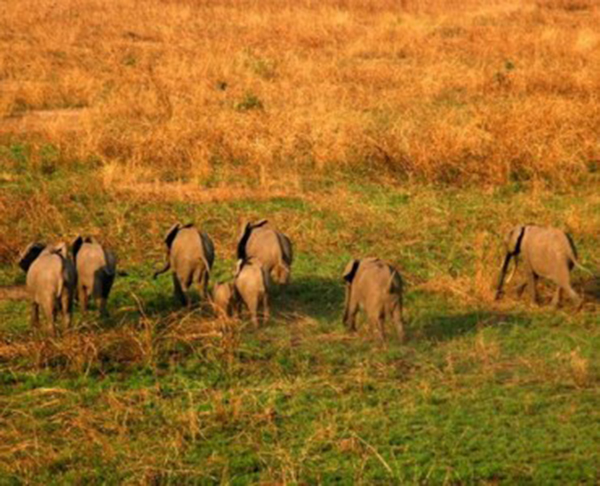
Upemba National Park[250]
По странному повороту сюжета, Монга недавно был назван первым «частным лицом», возглавившим проект строительства плотины в ДРК. Монга разрабатывает вызывающую споры гидроэлектростанцию Сомбве в рамках партнерства между своей компанией Kipay Investments и китайской государственной компанией PowerChina[251]. Предложенный проект стал объектом неодобрения со стороны защитников окружающей среды, которые утверждают, что он будет построен на экологически уязвимых охраняемых землях в национальном парке Упемба[252].
Как такое могло быть? Коррумпированные конголезские элиты не действуют в изоляции. Действия одного влиятельного брокера могут иметь огромные последствия для страны. Как отмечается в отчете за 2017 год, коррупция в ДРК представляет собой «сложную ситуацию, в которой серые субъекты действуют в основном в рамках законных институтов, но при этом предоставляют критически важные ресурсы для незаконной деятельности, включая добычу, переработку и торговлю минералами»[253]. Некоторые утверждают, что незаконный оборот полезных ископаемых, таких как колтан, является «основным экономическим, социальным и политическим источником нестабильности в [ДРК] и соседних стран»[254]. Ставки невероятно высоки – именно огромные залежи полезных ископаемых считаются причиной того, что ДРК является горячей точкой для торговли минералами, огнестрельным оружием и людьми, в том числе детьми[255].
Само собой разумеется, что подавляющее большинство конголезцев живут в условиях крайней нищеты. Катанга имеет уникальную ситуацию в мире: земля размером с половину европейского континента, с залежами полезных ископаемых на миллиарды долларов, управляемая очень далекой, очень слабой, коррумпированной и недееспособной центральной властью, в которой один человек, без какой-либо народной легитимности, без каких-либо профессиональных навыков, одновременно контролирует банки, шахты, таможню, логистическую систему и государственную администрацию. Возникает чрезвычайно тревожный вопрос: является ли эта ситуация наследием прошлого или это признак ужасного будущего, которое ожидает африканский континент?
The last half century of the history of the Democratic Republic of the Congo (formerly called Zaire) is overflowing with blood. Blood, which has been shed in civil wars, but also in conflicts with neighboring countries, against the private armies of foreign businessmen, or trying to contain the violence of small groups of bandits disguised as rebels. After the ousting of the dictator Mobutu, there was an attempt to restore democracy – which ended, as the photo shows, in the assassination of President Laurent Kabila, former rebel leader catapulted to power by a sum of conjunctural coincidences, almost all caused by from the intervention of those who have an interest in the exploitation of the immense mineral deposits of the former Zaire.
Between the times Mobutu and today it seems that everything has changed profoundly – and in an often violent way. Except for one thing: the man who, from behind the scenes, has seen his power grow, one coup after another, and above all the man who leads it, an Israeli businessman. We are talking about Eric Monga Mumba and Dan Gertler.
Africa is calling for a brand new man: an open, modern, elegant man who, among the reference models, has chosen the Western one, and therefore has discarded the Muslim and the Asian one. A man who has studied and who, in his profession, has found the strength to apply what he knows, without renouncing his traditions, but without yielding to the endemic weaknesses of the past. A strong man, determined, but not violent, who made his way through intelligence and diligence, not with corruption and intimidation.
You probably never heard this name before, but Eric Monga Mumba looks like a little bit like this. He is clearly a self-conscious, powerful and wealthy man, considered to be one of Congo’s “millionaires amidst the chaos”. Pictured in the opening scenes of a recent documentary, Monga can be seen drinking “the finest champagne” and smoking a fat cigar as he hosts a rooftop dinner party for friends, in celebration of having closed a big business deal[1]. In the documentary Monga claims that to get rich in the Congo, all you have to do is work hard[2]. This isn’t working for the majority of Congolese citizens, who live on less than $ 1.90 per day[3]. But was it just ‘hard work’ that brought him his wealth, and the prominent position he now occupies in Congolese affairs?
From Mobutu to Kabila: the success story of an ambitious young man

Eric Monga Mumba celebrates a big win by hosting a lavish rooftop dinner for friends[4]
Eric Monga Mumba was born in 1965 In Lubumbashi[5], the capital city of what is now known as Haut-Katanga province. Lubumbashi is the second largest city in DRC after Kinshasa. In that year, the Congo Crisis was coming to an end: for five years the people of Katanga had actively sought to secede from the rest of the Republic of Congo[6]. The Congo Crisis ultimately led to the assassination of Patrice Lumumba, Congo’s first post-independence Prime Minister[7].
Monga reportedly has a brother named Edy, who is a doctor based in Italy[8]. His father Katanga Monga was described as great businessman, and one of the first people to support artisanal mining in Katanga[9]. He grew up under the despotic rule of dictator Mobutu Seso Seko, ‘the epitome of the African kleptocrat’, under whose watch the streets of Kinshasa turned into open sewers full of starving people[10]. Well, Eric has been able to grow in that era and become something completely different: as everyone calls him now, “the boss of Katanga’s bosses”[11] (or “le Patron des Patrons Katangais”[12]).
In the early 90s, just a few years after gaining a degree in Economics, Monga found himself working in an advantageous government position at the BCC Banque Centrale du Congo (Congo’s central bank)[13]. At the BCC firstly Monga was deputy head of the Bureau of studies and exchanges[14], then he became a title holder in 1994, and between 1995 and 1997 he managed the banking supervision service[15]. Monga’s final years working at the BCC were spent amidst the chaos (and opportunity) of the First Congo War, which ended in 1997 after Mobutu was assassinated and Laurent-Désiré Kabila took power with the help of neighbouring countries Rwanda and Uganda[16].
In the late 90s the DRC’s mining assets were run down and essentially ruined[17]. They were also entirely owned by Gécamines, the state-owned mining company[18]. Sadly however, the decentralisation of assets that followed did not benefit most of DRC’s people. Instead, a “wholesale sell-off of Congo’s natural resources” to benefit a core of corrupt elites began in earnest in May 1997, when Laurent Kabila was sworn in[19].
Laurent Kabila’s turn at the helm of earth-ship-DRC was short-lived. Rwanda and Uganda (who had once supported his campaign) sent a new rebel army to oust him[20]. As he clung to power so the Second Congo War began, taking more than 5.4 million lives over the course of a decade[21]. Kabila senior was eventually assassinated in 2001 by one of his child soldiers[22]. His son Joseph took over where he left off. When Kabila junior took office ten days after his father’s death, his regime continued to privatise the DRC’s mining assets via corrupt deals struck to benefit his inner circle and himself[23].

The bloodthirsty dictator Mobutu Sese Seko a few months before his overthrow[24]
In 1998, after leaving the BCC Eric Monga was hired to Augustin Katumba Mwanke’s cabinet. Katumba was the governor of Katanga during Laurent Kabila short and ill-fated reign. His governorship ended in 2001, the year Kabila senior was assassinated. Monga spent this particularly tumultuous and conflict-ridden period in Congolese affairs acting as economic advisor to the governor of strategically important Katumba province[25].
In the DRC, elite criminal networks permeate the economy to such an extent that the looting of the state by Kabila and his cronies has often the appearance of legitimacy[26]. As such, DRC corruption presents “a complex situation of grey actors who mainly operate within lawful institutions but still providing critical resources for illegitimate activities that include the extraction, processing and trafficking of minerals”[27]. A 2017 report by the Global Observatory of Transnational Criminal Networks stated that there is “collaboration between the private and the public sectors” that sustains “a situation of generalized corruption, as well as humanitarian, social and political instability in the Democratic Republic of Congo and surrounding countries”[28].
While in the past various armies with transnational links controlled access to valuable resources, now local Mai-Mai militias and politicians have replaced them[29]. The UN Panel of Experts observed in 2002 that the “looting that was previously conducted by the armies themselves has been replaced with organized systems of embezzlement, tax fraud, extortion, the use of stock options as kickbacks and diversion of State funds conducted by groups that closely resemble criminal organizations”[30]. These criminal organisations, which operate behind a veil of apparent legitimacy, are made up of “elite networks” that operate “through advanced mechanisms of State co-optation”[31]. The very same elite networks that Eric Monga’s mentor Katumba belonged to, according to the UN Panel of Experts.
To illustrate the scale of this system, it is worth noting that in December 2016, just before Kabila’s constitutional mandate ran out, Kabila’s fifteen closest family members owned more than 70 companies according to a Bloomberg investigation into the family’s busines interests[32]. Their interests span the economy in diverse industries such as mining, banking, logistics, agriculture, hospitality and fuel[33]. Kabila’s twin sister Jaynet, whose name is associated with many companies, was named in the massive 2016 offshore data leak, the Panama Papers[34]. The exact value of the Kabila family’s assets is difficult to establish however, as the DRC economy remains highly informal and cash based[35].
Augustin Katumba Mwanke: Connector and Mentor

The murdered body of Laurent Désiré Kabila[36]
In 2015 vast Katanga was split into four administrative provinces: Tanganyika, Haut-Lomami, Lualaba and Haut-Katanga[37]. It is also the heartland of the Kabila family[38], and was the home province of both Laurent Kabila[39] and Katumba Mwanke[40]. For three years after DRC gained independence from Belgium in 1960 Katanga was a breakaway territory[41]. The region’s secessional spirit simmers on to this day. Eastern Katanga is densely rich in mineral wealth, supplying cobalt, copper, tin, radium, uranium and diamonds to international markets[42]. Trucks roar through the streets of Lubumbashi day and night, heading for the Zambian border and then onward to Asia[43].
Provincial authorities in Katanga “boast of its liberal mining regulations”[44]. The province sits on huge reserves of cobalt and high grade copper deposits[45]. In the ten years preceding 2008, copper prices rose enormously, and Katanga enjoyed a “spectacular economic boom”[46]. However, much of the benefits have failed to trickle down to the general population, and the euphoria of the boom hid “many threats, economic as well as ecological”[47]. Central government has been slow to pay Katanga its share of the funds generated by the Katangais economy, allegedly for fear that should the region economically outrank the rest of the country, secession could become more likely[48].
It is undoubtably true that “patterns of political interference, corruption and plundering of natural resources by the current and previous governments” are a key feature in the Katanga-Kinshasa dynamic[49]. Corruption is entrenched in the region and defines the provinces’ relationship with the centre of power in Kinshasa. In Katanga, companies get away with not paying taxes if they belong to various powerful individuals[50].
2006, a Global Witness report documented ruthless exploitation of miners by the government and trading companies in Katanga’s artisanal mining sector[51] and explored the role of political actors in mining related corruption in Katanga province[52]. At the local level, interviews conducted by Global Witness in 2006 indicated that Katangais politicians were taking a cut from mining deals[53] and that it was impossible to operate without a ‘political umbrella’ – the freedom to operate bought with regular large cash payments to Kabila and his inner circle[54]. This system operates at both the industrial and informal mining levels, facilitating a system of illicit exportation[55].
Eric Monga was economic advisor to Augustin Katumba Mwanke, who was governor of Katanga between 1998 and 2001[56]. It is important to note however that Katumba was so much more than a provincial governor, he was also a key aid to both of the Kabilas. Katumba was friends with Laurent Kabila[57] and went on to become Joseph Kabila’s closest advisor[58], and therefore one of the most powerful people in the DRC government.
A leaked cable from US Ambassador William J Garvelink described Katumba as someone who was known for his business acumen[59]. The cable suggested Katumba had ongoing health problems, and noted that some observers believed he was HIV positive[60]. He was viewed as a ‘shady’ and ‘nefarious’ member of Kabila’s inner circle.[61] He lived in South Africa until Mobutu’s death[62], where he apparently worked for a mining company[63]. He was the former head of the Alliance for the Presidential Majority (AMP)[64]. Perhaps most importantly Katumba was very close friends with Israeli billionaire Dan Gertler and is believed to have managed Kabila’s personal fortune.[65]

Augustin Katumba Mwanke[66]
Katumba was also widely known to be “a centrepiece in mining contracts”[67]. From 2001 to 2004 shortly after his governorship ended Katumba became a director of the Congolese subsidiary of Canadian multinational Anvil Mining[68]. It is believed that Katumba played a key role in negotiating Anvil’s mining contract in Katanga[69]: CEO Bill Turner admitted in a television interview that Anvil had paid Katumba “director’s fees” and that Anvil was renting a property of his in Lubumbashi for close to $4,000 per month[70]. Anvil Mining achieved international renown in 2004 when it became embroiled in the tragic Kilwa massacre[71]. Katumba’s relationship with Anvil illustrates his key positioning in large scale mining deals.
The 2002 final report of the UN Panel on the Illegal Exploitation of Natural Resources and Other Forms of Wealth in the DRC considered Katumba to be a “key power broker in mining and diplomatic deals”[72]. More worryingly, the UN Panel believed Monga’s boss to be one of the chief figures in an elite network of “political, military and commercial interests [that] seeks to maintain its grip on the main mineral resources… of the Government-controlled area [of the DRC]”[73]. The report said that the elite network of which Katumba was a part had “transferred ownership of at least US$ 5 billion of assets from the State mining sector to private companies under its control” in the three preceding years “with no compensation or benefit for the State treasury”[74].
The report described “a complex and deteriorating situation in which criminal networks are articulated by political leaders, public servants, mining companies and criminals such as militias, paramilitary groups and arms traffickers”[75]. The Panel put Katumba on its list of people that it recommended should have their assets frozen, be banned from travelling and be prevented from banking[76]. One report stated that he “played a key role in the trafficking of minerals” in the DRC while acting as Minister of the State Portfolio in 2002[77]. This position gave Katumba power over the DRC’s mining licenses, even after his time in office had ended[78]. One former Congolese minister observed that when Kabila made Katumba Minister, it marked the beginning of an entire “plundering system”[79].

February 12, 2012: The Gulfstream GIV with Katumba on board misses the landing in Bukavu, misses the runway and crashes into an embankment, breaking in two and killing the passengers[80]
After the UN report was published, Katumba continued to occupy leading positions: he was suspended from government by Kabila for less than a year, returning to office as General Secretary of Kabila’s People’s Party for Reconstruction and Development (PPRD)[81]. Subsequently he acted as a “roving ambassador” for Kabila, participating the Sun City peace accords (which led to the formation of Kabila’s transitional government), and in 2006 he was elected to the DRC National Assembly[82]. As Kabila’s closest advisor, Katumba clearly operated with impunity.
After the dust settled on the UN report, and Katumba was firmly established back in the centre of power, allegations against him kept emerging. In their 2006 report, Global Witness described an incident involving a contact of Katumba’s that took place in October 2005[83]. An intermediary trader involved in covering up the attempted theft of a consignment of minerals was believed to have close links to Katumba, and to relatives of Kabila[84]. The governor of Katanga (at that time Urbain Kisula Ngoy) had indicated that pressure had come from his hierarchy to let the goods through[85]. Augustin Katumba Mwanke was suddenly killed in a plane crash along with his co-pilot in February 2012[86], reportedly after telling a close associate that he feared for his life[87].
The birth and growth of Trade Service

Guy Kimenyembo, General Manager at Trade Service and – at the same time, Provincial President of the corporation of customs forwarders at FEC Katanga and Member of the executive committee of FCFASA (Federation of Customs Brokers and Freight Forwarders of Southern Africa)[88]
When Katumba’s governorship ended in 2001, so too did Eric Monga’s official government career. He became an agent of mines and quarries[89], and set up a company called Trade Service in Lubumbashi[90]: a research, tax and facilitation consultancy with over 100 employees[91] and quite soon a reputation as a hub for the corruption in the Congolese mining sector[92]. The company was set up by Monga and three other partners[93], Claude Mutomb (deceased), Guy Kimenyembo and Eric Kabila[94]. Kimenyembo’s presence is a clear violation of conflict of interest rules, as he is the most powerful man in control of Katanga’s customs and border posts with surrounding nations[95].
Eric Kabila is worthy of further consideration. His father is a shareholder of Trust Merchant Bank[96]. According to French Le Monde Diplomatique, like Monga Eric Kabila is also a former official of the of the BCC[97]. He is another agent of mines and quarries[98]. This includes advising on tax issues, obtaining titles, interacting with government, and organising transports[99].
Interestingly, he and Eric Monga are listed as the only two contacts for the Lubumbashi, Kinshasa and Matadi offices of a company called Trans-Med Shipping[100]. Most importantly, Eric Kabila was also close to Katumba Mwanke[101]. He purportedly made a fortune following to the ruin of Gécamines, by helping large companies after the adoption of the new mining law[102]. He certainly runs high in the Congolese high society – he was photographed with his family at the lavish 2016 meeting of the Lubumbashi Horse Circle at the Grand Hotel Karavia, organised by mining magnate George Forrest[103].
In 2008 Eric Monga set up La Société de Surveillance Minière in Likasi, an analysis laboratory that supposedly pays attention to placing former Gécamines executives, and graduates of Lubumbashi University, into the DRC mining sector[104]. Additionally, in 2012 Monga created DRC Mining Consulting Services (DRCMCS), a New York registered company of which he is the CEO[105]. DRCMCS is an independent mining consultancy offering a range of services to the international mining industry players associated with the exploitation of raw materials from the DRC[106].
His big win came in 2013, when Monga was elected president of the Katanga division of the Fédération des Entrepreneurs Congolais (FEC), the DRC’s biggest business lobby group[107]. This role is sometimes referred to as the Président du Patronat Katangais[108]. Patrick Muland Kabey and Jean Coundouris were elected to be his deputies[109]. Monga’s company La Société de Surveillance Minière was been made chair of the regional mines commission, and Trade Service was made chair of services, manufacturing and energy along with Muland’s and Coundouris’ companies, Mulykap and Hyper-Psaro respectively[110].

The building, seat of Gécamines, in Lubumbashi[111]
In 2013, while acting as a regional FEC president, Monga was accused of obstructing an investigation into customs fraud in Katanga: the investigation was commissioned by the public prosecutor’s office and carried out by a team led by then attorney-general Simon Nyandu Shabandu[112]. The Nyandu investigation examined 25 cases of alleged customs infractions and corruption at the Customs and Excise Agency (DGDA) in Lubumbashi, Katanga[113]. This was less than 10% of the number of cases due to be examined however[114], because the criminal investigation was cut short[115]. The Nyandu investigation report was never officially published, but it was leaked and examined by Reuters[116], and was published in its original French, and a translated English version, by the Africa Faith and Justice Network[117].
The report shone a light on corruption among customs officials of the DGDA in Katanga, who were colluding with companies that were allegedly under-valuing their imports and exports, and avoiding tax altogether[118]. Some customs officials were accused of destroying evidence proving tax evasion[119]. The leaked report found that 11 companies were liable for a total of around $741 million in unpaid taxes and fines[120]. It has been observed that had the remaining 90% of cases commissioned by the public prosecutor’s office actually been examined, it is likely that billions more dollars of funds lost to corruption and fraud would have been discovered[121].
One of the companies named for failing to pay taxes was Eric Monga’s Trade Service[122]. What is more, the Nyandu report specifically named Eric Monga as having attempted to obstruct the progress of the investigation: “While some offenders like COMEXAS, AACC and others had shown their good will to pay DGDA rights, others on the contrary tried to exploit the FEC Katanga, with the help of its President, a certain Eric Monga, who teamed together and used the channel of the local press to incite people to strike, or even to provoke a rebellion against the mission”[123].
The investigators found that there was a “lack of respect of businessmen vis-à-vis the customs administration”[124]. This combined with the “nonchalance of the DGDA agents” signified an “excessive degree of impunity” for corruption in the province[125]. The report’s authors were of the opinion that the “lack of availability and willingness on the part of certain businessmen to provide evidence” was indication of their guilt[126]. Another of the commission’s discoveries was the role of another powerful Congo figure, closely related to Eric Monga – the president of Gécamines[127], president of the FEC (of which Monga is the Katanga president)[128], the chairman of the audit committee of the BCC[129] and personal friend of the Kabila family[130]: Albert Yuma.
Albert Yuma Mulimbi

Albert Yuma Mulimbi[131]
Since the outcome of DRC’s 2018 elections, and its first democratic transition of power since independence, Kabila (and his Common Front for Congo) and Felix Tshisekedi (and his CACH coalition) have been officially governing together. However, according to the press, “Kabila does not intend to give up an ounce of power”[132]. There was talk of Yuma becoming prime minister of the new power sharing government, but he was ultimately rejected as a contender by President Felix Tshisekedi[133].
In 2019 Yuma, in his capacity as president of Gécamines, was at the centre of a complex loan dispute with Dan Gertler, which escalated to such a level that Yuma was prohibited from leaving Kinshasa on 17 December 2019 while the prosecutor’s office looked into the controversy[134]. An “independent source close to the case” observed early in 2020 that the dispute involved “a real power struggle between bigwigs from the old regime and the current president”.[135] Tshisekedi even made a statement in relation to the dispute on national television urging the courts “to do their job”[136].
In October 2017 a company owned by Dan Gertler, Fleurette Mumi Holdings Ltd, loaned Gécamines € 200 million[137]. Of the amount agreed, € 128 million was actually transferred to Gécamines[138]. Repayment of the € 128 million loan became due in April 2018, however by this time Dan Gertler was subject to US sanctions[139]. Gécamines (of which Yuma was in charge) argued that it could not repay the loan without risking sanctions itself[140]. Meanwhile Fluerette Mumi Ltd transferred ownership of the debt to another company owned by Dan Gertler, Ventora Development Sasu, which began proceedings to recover the loan in the Congolese courts[141]. The Lubumbashi Commercial Court ruled in favour of Ventora on 14 November 2019, but Gécamines refuses to pay and has appealed the ruling[142].
While Tshisekedi did however reappoint Yuma as president of Gécamines in the new government[143], Sama Lukonde, who is close to Tshisekedi, was made general manager[144]. Lukonde requested that certain Gécamines contracts be made public, including the transfer in 2017 of Gécamines’ rights to collect royalties from the Metalkol project to Gertler[145]. While Yuma and Gertler may be at odds over the loan dispute, according to political scientist and activist Mputu he opposes potential scrutiny of Gécamines’ dealings with the Israeli businessman Dan Gertler[146].
Who the hell is Dan Gertler?

Joseph Kabila, (center left) and Dan Gertler (center right)[147]
At least one member of the DRC’s elite criminal network has been the subject of intense international scrutiny – Dan Gertler[148], a kind of “soldier of fortune”[149] who started his career trading diamonds in Angola, which was in the midst of a civil war[150]. Way back during Laurent Kabila’s presidency, a rabbi introduced Gertler to his son Joseph, who was at the time the head of the Congolese army[151]. Gertler and Joseph became instant friends[152].
Gertler was at some point introduced to Joseph’s father Laurent, and became central to his attempts to maintain power once Rwanda and Uganda turned on him[153]. According to a UN report the two men struck a deal – Gertler was to provide $ 20 million and access to “Israeli military equipment” to the President in exchange for a monopoly on all DRC diamonds[154]. After Kabila senior’s assassination Gertler played a key role in the new regime, and was even sent by his close friend Joseph to act as an emissary in peace negotiations[155].
According to the US Treasury billionaire Gertler has “amassed his fortune through hundreds of millions of dollars’ worth of opaque and corrupt mining and oil deals in the Democratic Republic of the Congo”[156]. The US Treasury has accused Gertler of using his friendship with Kabila in order to act as a middleman for the under-priced sale of mining assets in the DRC, and observed that Gertler, “has acted for or on behalf of Kabila, helping Kabila organize offshore leasing companies”[157]. His network of assets in the DRC are held via approximately fifty companies registered in tax havens, and include contracts in copper, cobalt, diamond and oil industries[158].
In December 2017, Gertler and twenty of his companies became targets of US sanctions[159]. The US Treasury accused Gertler of using “his relationship with the Congolese head of state to act as an intermediary in the sale of mining assets in the Democratic Republic of Congo, forcing multinational companies to go through Gertler to do business with the Congolese state”[160]. They estimated that between 2010 and 2012 alone the DRC lost out by an eye-watering $ 1.36 billion due to under-valued assets being sold to Gertler’s offshore companies[161].
One deal alone in 2015 led to a loss of $ 149.5 million of potential revenue for the DRC. In addition to that $ 1.36 billion loss, the government’s lack of transparency over a mining deals with Gertler led to the IMF to cancel scheduled loans to the DRC worth $ 225 million in total[162]. The outgoing Trump administration succumbed to lobbying pressure and used its final days to ease the sanctions imposed on Gertler in 2017[163], but the sanctions were subsequently reinstated by President Biden[164].

Dan Gertler (left) at Augustin Katumba Mwanke’s hospital bed[165]
Through his friendship with Kabila and his inner circle, Gertler acquires under-valued mining assets and then resells the assets at market prices for vast profits. This way of acting has been described as asset flipping: “A specific DRC mining asset (say, ABC) is sold to an offshore entity, which then sells it on – known as a “flip” – at a massive profit, to another entity. The new owner then raises cash in Western markets and re-develops ABC as a legitimate mining asset. These deals are conducted by entities registered in, or associated with, tax havens, such as the British Virgin Islands”[166].
Gertler used this asset flipping strategy in relation to Global Enterprises Corporate (GEC), later renamed Nikanor[167]. GEC was formed in March 2005 by Gertler’s company, Dan Gertler International (DGI), along with another Israeli heavyweight: Benjamin Steinmetz[168]. Former DRC mines minister Simon Tuma-Waku acted as a special advisor[169]. A joint venture was formed between GEC and Gécamines to re-develop a massive ruined mine made up of multiple orebodies known by the acronym KOV[170].
The Lutundula Commission, a DRC National assembly commission, which in June 2005 reported on its investigation into illegal exploitation in the mining industry and “the legality of deals entered into” by actors involved in the DRC conflicts[171], recommended that negotiations over KOV be halted[172]. Despite this, in October 2003 the KOV agreement between GEC and Gécamines was ratified by presidential decree[173].
Gertler had paid $ 3 million for the KOV assets, which ultimately ended up with a market value of over $ 1 billion after a number of share offerings[174]. This enormous price increase illustrates just what the DRC government and people have lost because of this special relationship between Gertler, Kabila and members of Kabila’s inner circle: the DRC government has been entirely complicit in this system of plunder[175].
In 2010 reports it has been discovered that the rights to First Quantum’s $750 million Kingamyambo Musonoi Tailings (KMT) copper project had been signed away to Highwind Properties, a “mysterious”[176] BVI registered company with “shadowy representatives”[177]. DRC had created a new joint venture called Metalkol Sarl to control KMT, 30% of which was owned by Gécamines and 70% of which was owned by Highwind Properties[178]. Ultimately Highwind Properties turned out to be yet another company owned by Gertler[179].

Kasumbalesa customs, between Katanga and Zambia, for years controlled by Eric Monga Mumba and his Trade Service[180]
Gertler paid $ 60 million for KMT[181], but sold it to shady Kazakh mining giant ENRC for nearly $ 700 million[182]. First Quantum claimed to have built most of the $ 550 million copper processing plant at KMT when the rights were reassigned to Highwind Properties[183] and sued[184]. Perhaps unsurprisingly, a DRC court found that First Quantum no longer held title to the project and fined it $ 12 billion in damages[185]. Who did the Court of Appeal nominate as liquidator of First Quantum’s KMT assets? No surprise: Eric Monga[186].
In November 2020 Dan Gertler organised a press conference in Kinshasa[187]. This was out of character for Gertler, who has been always described as being “extremely discrete”[188]. At the time he was subject to the full extent of the US sanctions against him, including having his US assets and bank accounts seized[189].
Gertler, however, did not appear in person[190]: the journalists present instead were treated to a pre-recorded video message[191]. According to The Africa Report Gertler “grandly announced” an intention to “share with his Congolese brothers” the benefits of his successes in the DRC mining sector[192]. No further details[193]. According to CNPAV, a DRC citizen platform, the press conference was staged to divert public attention away from revelations about the 2017 Metalkol royalties transfer to Gertler mentioned above[194].
More and more scandals

Jean-Jacques Lumumba[195]
Day after day, the scandals about Gécamines and the Congolese mining sector are getting more and more. Next one regards the Lumumba Papers, a collection of leaked internal documents from the BGFIBank, which reveal financial irregularities between BGFI, the National Independent Electoral Commission, the Central Bank and several companies of Kabila’s inner circle[196]. The documents were analysed by the Platform to Protect Whistle-blowers in Africa (PPLAAF) and the Organized Crime and Corruption Reporting Project (OCCRP) and widely covered by the press.
BGFIBank is run by relatives of Kabila[197], and co-owned by his sister Gloria Mteyu[198]. Whistle-blower Jean-Jacques Lumumba, the nephew of the late first President Patrice Lumumba, was a senior executive of the BGFIBank[199]: as he raised concerns over financial irregularities with his superiors at the bank, Francis Selemani Mtwale (President Kabila’s adopted brother and managing director of the bank) threatened him with a firearm[200]. He ultimately fled the country with his family, taking a cache of compromising documents with him. The documents revealed four payments[201] amounting to an unsecured loan of $ 42.9 million from the BCC, the central bank, to the bank account of a company called EGAL Entreprise Générale d’Alimentation et de Logistique[202].
EGAL was officially incorporated on 12 October 2013, with tax-exempt status, but allegedly the company had been financially active for three months prior to this date[203]. According to is Annual Report, reviewed by PPLAAF, EGAL received significant tax cuts in 2014[204]. According to EGAL’s 2014 financial statement, at that time its shares were held by Eric Monga, Albert Yuma Mulimbi, and the Congolese companies Texico (which Yuma chairs)[205] and Aremad[206]. The board of directors was comprised of Eric Monga, Albert Yuma Mulimbi, the Belgian Marc Piedboeuf and the Congolese Alain Wan, who are both also members of Kabila’s inner circle[207]. It has been suggested that Monga no longer holds a position within EGAL after he had an argument with Kabila’s brother[208].
EGAL was established under the guise of supplying cheap imported food to the DRC’s many underfed communities[209]. Instead, it appears that it acted as a funnel for the transfer of state funds to offshore companies for the ultimate benefit of Kabila and his cronies[210]. The whistle-blower Lumumba told the OCCRP that in addition to funnelling money to private companies linked to Kabila’s inner circle, the BCC loan of $ 42.9 million acted as collateral for an additional $ 41 million loan from BGFIBank[211]. The transaction can be seen in the leaked banking records[212]. Lumumba considered the loan to be more of a ‘grant’, as no significant repayment had been made when he left the bank to flee to Belgium[213]. EGAL reportedly has no other income besides the loans granted by the BCC and BGFIBank[214].
The payments from the BCC $ 42.9 million raise many red flags. Firstly, the BCC does not have authority to transfer money to private companies[215], as is the norm for central banks[216]. Secondly, at the time the loans were made Albert Yuma Mulimbi was both a director and Chairman of the audit committee of the Central Bank[217] and a shareholder and director of EGAL loan[218]. Putting the illegality of the payments to one side, Yuma’s positioning represents an enormous conflict of interest. Yuma denied that the Central Bank had sent money to EGAL, but the banking records examined by OCCRP and PLAAF show otherwise[219]. Thirdly, EGAL’s board of directors was entirely comprised of (then president) Kabila’s inner circle[220].

A very young girl breaks up rock at an abandoned state-owned copper mine in the city of Kipushi in the Democratic Republic of Congo[221]
Le Monde described “childhood friends” Wan and Piedboeuf as managing both Kabila’s agricultural investments and farms[222]. Piedboeuf is both a director of EGAL and the administrator of Kabila’s company Ferme Espoir [223]. Wan is a director EGAL and of MW Afritec, which has recently been named in another whistleblower leak: the Banana Port Papers[224]. In 2010 Wan and Piedboeuf are reported to have sold la Société des Grands Elevages du Congo (GEL), which owns the island called Mateba, to Kabila[225]. Piedboeuf is the managing director of GEL[226].
Much of the $ 42.9 million BCC loan was then transferred from EGAL to foreign companies, also run by Piedboeuf and Wan[227]. The companies that received most of the funds were Samaki (Pty) Ltd in Namibia, All Ocean Logistics in the Færœr Islands and African Trading and Maintenance in Hong Kong[228]. Banking records examined by OCCRP show that a majority of the funds received went to these three companies, almost $ 38 million in total[229]. The companies were then involved in the purchase and transport of wild animals that were delivered to reserves belonging to Kabila’s company Ferme Espoir[230], including Kingakati reserve and Mateba island[231]. This suggests (at least) that BCC funds were embezzled to buy exotic pets for Kabila, and that Monga’s company EGAL acted as a funnel.
African Trading Maintenance and Development, Hong Kong, received 20 transfers from EGAL totalling $ 9.97 million between June 2013 and June 2014[232]. Samaki, Namibia, received transfers from EGAL totalling $ 22.8 million, including the largest single transfer of $ 11.5 million in August 2013[233]. This Namibian company, which received the majority of the Central Bank fund that were funnelled through EGAL, is reported to have an almost identical board to EGAL, made up of Kabila’s inner circle[234]. This includes Piedboeuf, Wan, Yuma[235], and Eric Monga[236]. OCCRP explained that Samaki is managed by politically influential Namibian Martha Namundiebo-Tilahun, and her husband Haddis Tilahun is also a director[237].
All Ocean Logistics, Færœr Islands received $ 5 million from EGAL between October 2013 and June 2015. Andre Wan, who OCCRP believes to be the son of Alain Wan, is the main shareholder[238]. In 2013, using funds received from EGAL[239], All Ocean Logistics acquired a cargo ship named El Nino for about € 800,000 in cash[240]. Although by 2017, at the time of the OCCRP investigation, El Nino was owned by EGAL, since its acquisition in 2013 the vessel has been used to ship wild game to game parks owned by Kabila[241]. Le Monde reported that in May 2017 around 450 wild animals were transported from Namibia by El Nino. Animals included giraffes, buffaloes, antelopes, gazelles, wildebeest and zebras according to Le Monde[242].
Invoices for the animals published by OCCRP show that Kabila’s company Ferme Espoir paid El Nino to transfer the animals[243], but a wildlife veterinarian from the exporter of the animals, Super Games Dealer, told OCCRP that the bills were actually paid by Monga and Yuma’s EGAL[244]. Furthermore, OCCRP alleges that the ship’s tracking system was switched on and off along the coast “while the ship was shifting goods onto another vessel”[245].
PPLAAF described the EGAL debacle as, “a vast fraudulent system combining several front companies to spend public money for the private interests of Ferme Espoir, a company owned by President Kabila”[246]. Analysts are rightly concerned by this mobilisation of Kabila’s business networks to satisfy his “animal fad”[247]. Whether something even more nefarious is cloaked behind this set up however remains to be seen. According to Congolese press, EGAL filed a defamation complaint against whistleblower Jean-Jacques Lumumba with the Kinshasa/Gombe High Court Prosecutor’s Office on 31 December 2020[248]. The complaint alleges that during a broadcast called “Marius chez vous” from the US the day before the complaint was filed, Lumumba accused Monga’s EGAL of money laundering, arms dealing and other illicit activities[249]. The fact that El Nino’s tracking system was at times switched of remains highly concerning.
An entire nation held hostage

Upemba National Park[250]
In an odd plot twist, Monga has recently been named as the first ‘private’ person to be spearheading a dam building project in the DRC. Monga is developing the controversial Sombwe Hydro Power Plant through a partnership between his company Kipay Investments, and PowerChina, a Chinese state-owned company[251]. The proposed project has become the target of disapprobation by environmental campaigners, who claim that it will be built on ecologically sensitive protected land in Upemba National Park[252].
How could this be possible? Corrupt Congolese elites do not operate in a bubble. The ramifications of one power broker’s actions for the country can be vast. As noted in a 2017 report, DRC corruption presents “a complex situation of grey actors who mainly operate within lawful institutions but still providing critical resources for illegitimate activities that include the extraction, processing and trafficking of minerals”[253]. And some argue that the trafficking of minerals, such as Coltan, is “the main economic, social and political source of instability in [the DRC] and surrounding countries”[254]. The stakes are incredibly high – it’s vast mineral deposits are considered to be the reason why the DRC is a hotspot for the trafficking of minerals, firearms and humans, even including children[255].
It goes without saying that the vast majority of Congolese live in conditions of extreme misery. That of Katanga is a unique situation in the world: a land the size of half of the European continent, with mineral deposits worth billions of dollars, administered by a very distant, very weak, corrupt and incapable central power, in which a single man, without any popular legitimacy, without any professional skill, controls at the same time the banks, the mines, the customs, the logistic system and the state administration. The question that arises is extremely worrying: is it a situation that is a legacy of the past, or is it the sign of a terrible future that awaits the African continent?
FRA005
[1] https://www.youtube.com/watch?v=Od5yC4iQbxI
[2] https://www.youtube.com/watch?v=Od5yC4iQbxI
[3] https://www.worldbank.org/en/country/drc/overview
[4] https://www.youtube.com/watch?v=Od5yC4iQbxI
[5] 2018.10.22 Trade Service, Etudes, Fiscalite & Facilitations, Lubumbashi
[6] David N. Gibbs, “The political economy of Third World intervention: Mines, money and US policy in the Congo crisis”, University of Chicago Press, Chicago 1991
[7] Ludo de Witte, “The assassination of Lumumba”, Verso Books, New York 2003; http://news.bbc.co.uk/onthisday/hi/dates/stories/february/19/newsid_2748000/2748931.stm
[8] https://miningnewsmagazine.org/enquete-fec-eric-monga-et-patrick-muland-vs-douaniers-declarants-et-reseau-denrichissement-a-la-dgdakatanga-les-en-dessous-dun-bras-de-fer-et-dune-guerre-dinterets/
[9] https://miningnewsmagazine.org/enquete-fec-eric-monga-et-patrick-muland-vs-douaniers-declarants-et-reseau-denrichissement-a-la-dgdakatanga-les-en-dessous-dun-bras-de-fer-et-dune-guerre-dinterets/
[10] https://projekte.sueddeutsche.de/paradisepapers/wirtschaft/mining-for-control-in-glencore-s-congo-e774511/
[11] https://www.lemonde.fr/afrique/article/2017/07/13/girafes-buffles-et-zebres-en-cargo-ou-les-lubies-animalieres-de-joseph-kabila_5160098_3212.html
[12] https://miningnewsmagazine.org/eric-monga-nouveau-president-du-patronat-katangais/
[13] https://miningandbusiness.com/2019/09/11/eric-monga-mumba/
[14] https://miningnewsmagazine.org/eric-monga-nouveau-president-du-patronat-katangais/
[15] https://miningnewsmagazine.org/eric-monga-nouveau-president-du-patronat-katangais/
[16] https://projekte.sueddeutsche.de/paradisepapers/wirtschaft/mining-for-control-in-glencore-s-congo-e774511/
[17] https://panamapapers.investigativecenters.org/drc-copper-mining/
[18] https://projekte.sueddeutsche.de/paradisepapers/wirtschaft/mining-for-control-in-glencore-s-congo-e774511/
[19] https://projekte.sueddeutsche.de/paradisepapers/wirtschaft/mining-for-control-in-glencore-s-congo-e774511/
[20] https://projekte.sueddeutsche.de/paradisepapers/wirtschaft/mining-for-control-in-glencore-s-congo-e774511/
[21] https://www.reuters.com/article/us-congo-democratic-death-idUSL2280201220080122
[22] https://www.theguardian.com/world/2001/feb/11/theobserver
[23] https://projekte.sueddeutsche.de/paradisepapers/wirtschaft/mining-for-control-in-glencore-s-congo-e774511/
[24] https://schoolforafrica.org/democratic-republic-of-congo/mobutu-sese-seko/
[25] https://www.jeuneafrique.com/141246/economie/katanga-initiative-ric-monga-du-conseil-fiscal-au-labo-d-analyses/
[26] https://oenz.de/sites/default/files/business_risks_and_the_drc_-_what_happens_when_kabila_steps_down_1.pdf
[27] https://www.researchgate.net/profile/Eduardo_Salcedo-Albaran/publication/322339311_Coltan_Trafficking_Network_in_the_Democratic_Republic_of_the_Congo/links/5a54e6764585152af77fd73d/Coltan-Trafficking-Network-in-the-Democratic-Republic-of-the-Congo.pdf
[28] https://www.researchgate.net/profile/Eduardo_Salcedo-Albaran/publication/322339311_Coltan_Trafficking_Network_in_the_Democratic_Republic_of_the_Congo/links/5a54e6764585152af77fd73d/Coltan-Trafficking-Network-in-the-Democratic-Republic-of-the-Congo.pdf
[29] https://www.researchgate.net/profile/Eduardo_Salcedo-Albaran/publication/322339311_Coltan_Trafficking_Network_in_the_Democratic_Republic_of_the_Congo/links/5a54e6764585152af77fd73d/Coltan-Trafficking-Network-in-the-Democratic-Republic-of-the-Congo.pdf
[30] https://repositories.lib.utexas.edu/bitstream/handle/2152/5170/2477.pdf?sequence=1
[31] https://www.researchgate.net/profile/Eduardo_Salcedo-Albaran/publication/322339311_Coltan_Trafficking_Network_in_the_Democratic_Republic_of_the_Congo/links/5a54e6764585152af77fd73d/Coltan-Trafficking-Network-in-the-Democratic-Republic-of-the-Congo.pdf
[32] https://www.bloomberg.com/news/features/2016-12-15/with-his-family-fortune-at-stake-congo-president-kabila-digs-in
[33] https://www.bloomberg.com/news/features/2016-12-15/with-his-family-fortune-at-stake-congo-president-kabila-digs-in
[34] https://offshoreleaks.icij.org/stories/jaynet-desiree-kabila-kyungu
[35] https://oenz.de/sites/default/files/business_risks_and_the_drc_-_what_happens_when_kabila_steps_down_1.pdf
[36] http://bakanyarwanda.blogspot.com/2017/06/the-hidden-rwandan-origins-of-joseph.html
[37] https://www.theindependent.co.zw/2017/06/19/drc-dangerous-battle-influence-former-katanga/ ;
[38] https://cdn2.globalwitness.org/archive/files/import/kat-doc-engl-lowres.pdf p42
[39] https://cdn2.globalwitness.org/archive/files/import/kat-doc-engl-lowres.pdf p42
[40] https://congomasquerade.blogspot.com/2012/02/augustin-katumba-mwanke-profile.html ; https://projekte.sueddeutsche.de/paradisepapers/wirtschaft/mining-for-control-in-glencore-s-congo-e774511/
[41] https://archive.globalpolicy.org/security/issues/congo/2008/0701coppercolony.htm
[42] https://archive.globalpolicy.org/security/issues/congo/2008/0701coppercolony.htm
[43] https://archive.globalpolicy.org/security/issues/congo/2008/0701coppercolony.htm
[44] https://archive.globalpolicy.org/security/issues/congo/2008/0701coppercolony.htm
[45] https://archive.globalpolicy.org/security/issues/congo/2008/0701coppercolony.htm
[46] https://archive.globalpolicy.org/security/issues/congo/2008/0701coppercolony.htm
[47] https://archive.globalpolicy.org/security/issues/congo/2008/0701coppercolony.htm
[48] https://archive.globalpolicy.org/security/issues/congo/2008/0701coppercolony.htm
[49] https://cdn2.globalwitness.org/archive/files/import/kat-doc-engl-lowres.pdf p 42
[50] https://cdn2.globalwitness.org/archive/files/import/kat-doc-engl-lowres.pdf p 44
[51] https://cdn2.globalwitness.org/archive/files/import/kat-doc-engl-lowres.pdf
[52] https://cdn2.globalwitness.org/archive/files/import/kat-doc-engl-lowres.pdf
[53] https://cdn2.globalwitness.org/archive/files/import/kat-doc-engl-lowres.pdf p 43
[54] https://cdn2.globalwitness.org/archive/files/import/kat-doc-engl-lowres.pdf p 42
[55] https://cdn2.globalwitness.org/archive/files/import/kat-doc-engl-lowres.pdf p 42
[56] https://cdn2.globalwitness.org/archive/files/import/kat-doc-engl-lowres.pdf p 42
[57] https://congomasquerade.blogspot.com/2012/02/augustin-katumba-mwanke-profile.html
[58] https://www.monde-diplomatique.fr/publications/manuel_d_economie_critique/
[59] https://wikileaks.org/plusd/cables/09KINSHASA1080_a.html
[60] https://wikileaks.org/plusd/cables/09KINSHASA1080_a.html
[61] https://wikileaks.org/plusd/cables/09KINSHASA1080_a.html
[62] https://congomasquerade.blogspot.com/2012/02/augustin-katumba-mwanke-profile.html
[63] https://www.researchgate.net/profile/Eduardo_Salcedo-Albaran/publication/322339311_Coltan_Trafficking_Network_in_the_Democratic_Republic_of_the_Congo/links/5a54e6764585152af77fd73d/Coltan-Trafficking-Network-in-the-Democratic-Republic-of-the-Congo.pdf
[64] https://congomasquerade.blogspot.com/2012/02/augustin-katumba-mwanke-profile.html
[65] https://congomasquerade.blogspot.com/2012/02/augustin-katumba-mwanke-profile.html
[66] https://sacrebopol.blogspot.com/2012/02/le-corps-de-katumba-mwanke-est-arrive.html?m=0
[67] https://eprints.lse.ac.uk/74488/1/Africa%20at%20LSE%20%E2%80%93%20DR%20Congo%20President%E2%80%99s%20%E2%80%9CRevolution%20of%20Modernity%E2%80%9D%20is%20starting%20to%20look%20like%20%E2%80%9Cbusiness%20as%20usual%E2%80%9D.pdf
[68] https://cdn2.globalwitness.org/archive/files/import/kat-doc-engl-lowres.pdf p 42
[69] https://cdn2.globalwitness.org/archive/files/import/kat-doc-engl-lowres.pdf p 42
[70] https://cdn2.globalwitness.org/archive/files/import/kat-doc-engl-lowres.pdf p 42
[71] https://www.raid-uk.org/sites/default/files/timeline-kilwa.pdf
[72] https://repositories.lib.utexas.edu/bitstream/handle/2152/5170/2477.pdf?sequence=1 p7
[73] https://repositories.lib.utexas.edu/bitstream/handle/2152/5170/2477.pdf?sequence=1 p7
[74] https://repositories.lib.utexas.edu/bitstream/handle/2152/5170/2477.pdf?sequence=1 p7
[75] https://www.researchgate.net/profile/Eduardo_Salcedo-Albaran/publication/322339311_Coltan_Trafficking_Network_in_the_Democratic_Republic_of_the_Congo/links/5a54e6764585152af77fd73d/Coltan-Trafficking-Network-in-the-Democratic-Republic-of-the-Congo.pdf
[76] https://repositories.lib.utexas.edu/bitstream/handle/2152/5170/2477.pdf?sequence=1 Annex II
[77] https://www.researchgate.net/profile/Eduardo_Salcedo-Albaran/publication/322339311_Coltan_Trafficking_Network_in_the_Democratic_Republic_of_the_Congo/links/5a54e6764585152af77fd73d/Coltan-Trafficking-Network-in-the-Democratic-Republic-of-the-Congo.pdf
[78] https://projekte.sueddeutsche.de/paradisepapers/wirtschaft/mining-for-control-in-glencore-s-congo-e774511/
[79] https://projekte.sueddeutsche.de/paradisepapers/wirtschaft/mining-for-control-in-glencore-s-congo-e774511/
[80] https://www.baaa-acro.com/crash/crash-gulfstream-giv-bukavu-6-killed
[81] https://cdn.globalwitness.org/archive/files/library/friends_in_need_en_lr.pdf p18
[82] https://cdn.globalwitness.org/archive/files/library/friends_in_need_en_lr.pdf p18
[83] https://cdn2.globalwitness.org/archive/files/import/kat-doc-engl-lowres.pdf
[84] https://cdn2.globalwitness.org/archive/files/import/kat-doc-engl-lowres.pdf p44
[85] https://cdn2.globalwitness.org/archive/files/import/kat-doc-engl-lowres.pdf p44
[86] https://www.aljazeera.com/news/2012/2/12/dr-congo-presidents-aide-killed-in-crash
[87] https://www.ft.com/content/7dc13ec9-721c-41a7-8423-daeb9a743e9a
[88] https://miningandbusiness.com/2019/09/11/guy-kimenyembo-directeur-general-de-trade-service-sarl/
[89] https://miningnewsmagazine.org/eric-monga-nouveau-president-du-patronat-katangais/
[90] https://www.jeuneafrique.com/141246/economie/katanga-initiative-ric-monga-du-conseil-fiscal-au-labo-d-analyses/
[91] https://miningandbusiness.com/2019/09/11/eric-monga-mumba/
[92] https://org.salsalabs.com/o/1552/images/The%20Nyandu%20Mission%20on%20Corruption%20in%20DRC.pdf
[93] https://miningandbusiness.com/2019/09/11/eric-monga-mumba/
[94] 2018.10.22 Trade Service, Etudes, Fiscalite & Facilitations, Lubumbashi
[95] https://miningandbusiness.com/2019/09/11/guy-kimenyembo-directeur-general-de-trade-service-sarl/
[96] https://miningnewsmagazine.org/enquete-fec-eric-monga-et-patrick-muland-vs-douaniers-declarants-et-reseau-denrichissement-a-la-dgdakatanga-les-en-dessous-dun-bras-de-fer-et-dune-guerre-dinterets/
[97] https://www.monde-diplomatique.fr/publications/manuel_d_economie_critique/
[98] https://lepantheon.org/nous-accompagnons-nos-clients-miniers-a-bien-faire-leur-travail/ ; https://lepantheon.org/nous-accompagnons-nos-clients-miniers-a-bien-faire-leur-travail/eric-kabila-kisimba/
[99] https://lepantheon.org/nous-accompagnons-nos-clients-miniers-a-bien-faire-leur-travail/eric-kabila-kisimba/
[100] https://www.transmedship.co.za/contact_us.php
[101] https://www.monde-diplomatique.fr/publications/manuel_d_economie_critique/
[102] https://www.monde-diplomatique.fr/publications/manuel_d_economie_critique/
[103] https://www.monde-diplomatique.fr/publications/manuel_d_economie_critique/
[104] https://www.jeuneafrique.com/141246/economie/katanga-initiative-ric-monga-du-conseil-fiscal-au-labo-d-analyses/
[105] https://opengovny.com/corporation/4335706
[106] https://miningnewsmagazine.org/eric-monga-nouveau-president-du-patronat-katangais/
[107] https://miningandbusiness.com/2019/09/11/eric-monga-mumba/
[108] https://miningnewsmagazine.org/eric-monga-nouveau-president-du-patronat-katangais/
[109] https://miningnewsmagazine.org/eric-monga-nouveau-president-du-patronat-katangais/
[110] https://miningnewsmagazine.org/eric-monga-nouveau-president-du-patronat-katangais/
[111] https://forrestgroup.com/realisations/gecamines/
[112] https://www.herald.co.zw/foreign-miners-fleece-drc/
[113] https://www.herald.co.zw/foreign-miners-fleece-drc/
[114] https://afjn.org/the-u-s-must-stop-subsidizing-corruption-and-impunity-in-drc-congo-the-case-of-3-7-billion-in-fraud/
[115] https://org.salsalabs.com/o/1552/images/The%20Nyandu%20Mission%20on%20Corruption%20in%20DRC.pdf p8
[116] https://www.herald.co.zw/foreign-miners-fleece-drc/
[117] https://afjn.org/the-u-s-must-stop-subsidizing-corruption-and-impunity-in-drc-congo-the-case-of-3-7-billion-in-fraud/
[118] https://www.herald.co.zw/foreign-miners-fleece-drc/
[119] https://www.herald.co.zw/foreign-miners-fleece-drc/
[120] https://www.herald.co.zw/foreign-miners-fleece-drc/
[121] https://afjn.org/the-u-s-must-stop-subsidizing-corruption-and-impunity-in-drc-congo-the-case-of-3-7-billion-in-fraud/
[122] https://www.herald.co.zw/foreign-miners-fleece-drc/
[123] https://org.salsalabs.com/o/1552/images/The%20Nyandu%20Mission%20on%20Corruption%20in%20DRC.pdf
[124] https://org.salsalabs.com/o/1552/images/The%20Nyandu%20Mission%20on%20Corruption%20in%20DRC.pdf
[125] https://org.salsalabs.com/o/1552/images/The%20Nyandu%20Mission%20on%20Corruption%20in%20DRC.pdf
[126] https://org.salsalabs.com/o/1552/images/The%20Nyandu%20Mission%20on%20Corruption%20in%20DRC.pdf
[127] https://www.bloomberg.com/profile/person/16215237
[128] https://allafrica.com/stories/202103220876.html
[129] https://www.lemonde.fr/afrique/article/2017/07/13/girafes-buffles-et-zebres-en-cargo-ou-les-lubies-animalieres-de-joseph-kabila_5160098_3212.html
[130] https://www.occrp.org/en/investigations/7234-drc-company-promised-cheap-food-delivers-stolen-money
[131] https://afrique.latribune.fr/think-tank/entretiens/2018-11-20/albert-yuma-mulimbi-mes-fonctions-me-rendent-credible-aux-yeux-du-chef-de-l-etat-797944.html
[132] https://www.theafricareport.com/13674/drcs-moise-katumbi-i-will-be-an-constructive-but-extremely-vigilant-opponent/
[133] https://www.bloomberg.com/profile/person/16215237
[134] https://www.theafricareport.com/21839/drc-albert-yuma-and-dan-gertler-in-complex-gecamines-loan-dispute/
[135] https://www.theafricareport.com/21839/drc-albert-yuma-and-dan-gertler-in-complex-gecamines-loan-dispute/
[136] https://www.theafricareport.com/21839/drc-albert-yuma-and-dan-gertler-in-complex-gecamines-loan-dispute/
[137] https://www.theafricareport.com/21839/drc-albert-yuma-and-dan-gertler-in-complex-gecamines-loan-dispute/
[138] https://www.theafricareport.com/21839/drc-albert-yuma-and-dan-gertler-in-complex-gecamines-loan-dispute/
[139] https://www.theafricareport.com/21839/drc-albert-yuma-and-dan-gertler-in-complex-gecamines-loan-dispute/
[140] https://www.theafricareport.com/21839/drc-albert-yuma-and-dan-gertler-in-complex-gecamines-loan-dispute/
[141] https://www.theafricareport.com/21839/drc-albert-yuma-and-dan-gertler-in-complex-gecamines-loan-dispute/
[142] https://www.theafricareport.com/21839/drc-albert-yuma-and-dan-gertler-in-complex-gecamines-loan-dispute/
[143] https://www.theafricareport.com/21839/drc-albert-yuma-and-dan-gertler-in-complex-gecamines-loan-dispute/
[144] https://www.theafricareport.com/54978/drc-embattled-dan-gertler-tries-communication-blitz/
[145] https://www.theafricareport.com/54978/drc-embattled-dan-gertler-tries-communication-blitz/
[146] https://www.theafricareport.com/54978/drc-embattled-dan-gertler-tries-communication-blitz/
[147] https://ici.radio-canada.ca/nouvelles/special/2017/paradise-papers/glencore-compagnie-miniere-paradis-fiscaux-afrique-canada-dan-gertler/index.html
[148] https://projekte.sueddeutsche.de/paradisepapers/wirtschaft/mining-for-control-in-glencore-s-congo-e774511/
[149] https://projekte.sueddeutsche.de/paradisepapers/wirtschaft/mining-for-control-in-glencore-s-congo-e774511/
[150] https://projekte.sueddeutsche.de/paradisepapers/wirtschaft/mining-for-control-in-glencore-s-congo-e774511/
[151] https://projekte.sueddeutsche.de/paradisepapers/wirtschaft/mining-for-control-in-glencore-s-congo-e774511/
[152] https://projekte.sueddeutsche.de/paradisepapers/wirtschaft/mining-for-control-in-glencore-s-congo-e774511/
[153] https://projekte.sueddeutsche.de/paradisepapers/wirtschaft/mining-for-control-in-glencore-s-congo-e774511/
[154] https://projekte.sueddeutsche.de/paradisepapers/wirtschaft/mining-for-control-in-glencore-s-congo-e774511/
[155] https://projekte.sueddeutsche.de/paradisepapers/wirtschaft/mining-for-control-in-glencore-s-congo-e774511/
[156] https://home.treasury.gov/news/press-releases/sm0243
[157] https://home.treasury.gov/news/press-releases/sm0243
[158] https://www.theafricareport.com/54978/drc-embattled-dan-gertler-tries-communication-blitz/
[159] https://home.treasury.gov/news/press-releases/sm0243
[160] https://www.theafricareport.com/21839/drc-albert-yuma-and-dan-gertler-in-complex-gecamines-loan-dispute/
[161] https://www.theafricareport.com/21839/drc-albert-yuma-and-dan-gertler-in-complex-gecamines-loan-dispute/
[162] https://home.treasury.gov/news/press-releases/sm0243
[163] https://www.nytimes3xbfgragh.onion/2021/01/24/us/politics/dan-gertler-sanctions.html
[164] https://www.ft.com/content/7fe9e2c3-197b-48d6-b8df-276832fc56cd
[165] https://projekte.sueddeutsche.de/paradisepapers/wirtschaft/mining-for-control-in-glencore-s-congo-e774511/
[166] https://panamapapers.investigativecenters.org/drc-copper-mining/
[167] https://panamapapers.investigativecenters.org/drc-copper-mining/
[168] https://panamapapers.investigativecenters.org/drc-copper-mining/
[169] https://panamapapers.investigativecenters.org/drc-copper-mining/
[170] https://panamapapers.investigativecenters.org/drc-copper-mining/
[171] https://www.raid-uk.org/sites/default/files/pr-implement-lutundula.pdf
[172] https://panamapapers.investigativecenters.org/drc-copper-mining/
[173] https://panamapapers.investigativecenters.org/drc-copper-mining/
[174] https://panamapapers.investigativecenters.org/drc-copper-mining/
[175] https://panamapapers.investigativecenters.org/drc-copper-mining/
[176] https://www.globalwitness.org/en/archive/more-transparency-resource-sector-vital-congo-benefit-debt-relief/
[177] https://www.africa-confidential.com/article-preview/id/3626/Contract_clashes
[178] https://www.mining.com/meet-the-israeli-middleman-said-to-have-stripped-and-flipped-first-quantums-drc-mine-76979/
[179] https://panamapapers.investigativecenters.org/drc-copper-mining/
[180] https://www.radiookapi.net/economie/2014/12/16/katanga-plus-de-100-vehicules-bloques-au-poste-douanier-de-kasumbalesa
[181] https://panamapapers.investigativecenters.org/drc-copper-mining/
[182] https://panamapapers.investigativecenters.org/drc-copper-mining/
[183] https://www.africa-confidential.com/article-preview/id/3626/Contract_clashes
[184] https://www.africa-confidential.com/article-preview/id/3626/Contract_clashes
[185] https://www.africa-confidential.com/article-preview/id/3626/Contract_clashes
[186] https://www.africa-confidential.com/article-preview/id/3626/Contract_clashes
[187] https://www.theafricareport.com/54978/drc-embattled-dan-gertler-tries-communication-blitz/
[188] https://www.theafricareport.com/54978/drc-embattled-dan-gertler-tries-communication-blitz/
[189] https://www.theafricareport.com/54978/drc-embattled-dan-gertler-tries-communication-blitz/
[190] https://www.theafricareport.com/54978/drc-embattled-dan-gertler-tries-communication-blitz/
[191] https://www.theafricareport.com/54978/drc-embattled-dan-gertler-tries-communication-blitz/
[192] https://www.theafricareport.com/54978/drc-embattled-dan-gertler-tries-communication-blitz/
[193] https://www.theafricareport.com/54978/drc-embattled-dan-gertler-tries-communication-blitz/
[194] https://www.theafricareport.com/54978/drc-embattled-dan-gertler-tries-communication-blitz/
[195] https://afrique.lalibre.be/26057/jean-jacques-lumumba-le-palu-insulte-le-nom-de-mon-aieul/
[196] https://www.pplaaf.org/cases/the-lumumba-papers.html
[197] https://www.pplaaf.org/cases/the-lumumba-papers.html
[198] https://www.occrp.org/en/investigations/7234-drc-company-promised-cheap-food-delivers-stolen-money
[199] https://www.pplaaf.org/cases/the-lumumba-papers.html
[200] https://www.pplaaf.org/cases/the-lumumba-papers.html
[201] https://www.occrp.org/en/investigations/7234-drc-company-promised-cheap-food-delivers-stolen-money
[202] https://www.pplaaf.org/cases/the-lumumba-papers.html
[203] https://www.occrp.org/en/investigations/7234-drc-company-promised-cheap-food-delivers-stolen-money
[204] https://www.pplaaf.org/cases/the-lumumba-papers.html
[205] https://www.occrp.org/en/investigations/7234-drc-company-promised-cheap-food-delivers-stolen-money
[206] https://www.occrp.org/documents/drc-company-promised-cheap-food-delivers-stolen-money/DRC-9-EGAL-annuel-report.pdf p6
[207] https://www.occrp.org/documents/drc-company-promised-cheap-food-delivers-stolen-money/DRC-9-EGAL-annuel-report.pdf p6
[208] http://www.lumumbapapers.info/
[209] https://www.occrp.org/en/investigations/7234-drc-company-promised-cheap-food-delivers-stolen-money
[210] https://www.occrp.org/en/investigations/7234-drc-company-promised-cheap-food-delivers-stolen-money
[211] https://www.occrp.org/en/investigations/7234-drc-company-promised-cheap-food-delivers-stolen-money
[212] https://www.occrp.org/en/investigations/7234-drc-company-promised-cheap-food-delivers-stolen-money
[213] https://www.occrp.org/en/investigations/7234-drc-company-promised-cheap-food-delivers-stolen-money
[214] https://www.pplaaf.org/cases/the-lumumba-papers.html
[215] https://www.pplaaf.org/cases/the-lumumba-papers.html
[216] https://www.occrp.org/en/investigations/7234-drc-company-promised-cheap-food-delivers-stolen-money
[217] https://www.occrp.org/en/investigations/7234-drc-company-promised-cheap-food-delivers-stolen-money
[218] https://www.pplaaf.org/cases/the-lumumba-papers.html
[219] https://www.occrp.org/en/investigations/7234-drc-company-promised-cheap-food-delivers-stolen-money
[220] https://www.pplaaf.org/cases/the-lumumba-papers.html
[221] https://www.theglobeandmail.com/news/world/the-child-miners-of-congo/article4486038/
[222] https://www.lemonde.fr/afrique/article/2017/07/13/girafes-buffles-et-zebres-en-cargo-ou-les-lubies-animalieres-de-joseph-kabila_5160098_3212.html
[223] https://www.pplaaf.org/cases/the-lumumba-papers.html
[224] https://www.pplaaf.org/cases/the-banana-port-papers.html
[225] https://www.lemonde.fr/afrique/article/2017/07/13/girafes-buffles-et-zebres-en-cargo-ou-les-lubies-animalieres-de-joseph-kabila_5160098_3212.html
[226] https://www.lemonde.fr/afrique/article/2017/07/13/girafes-buffles-et-zebres-en-cargo-ou-les-lubies-animalieres-de-joseph-kabila_5160098_3212.html
[227] https://www.occrp.org/en/daily/9236-whistleblowers-sue-gabon-bank-after-unveiling-corruption
[228] https://www.pplaaf.org/cases/the-lumumba-papers.html
[229] https://www.occrp.org/en/investigations/7234-drc-company-promised-cheap-food-delivers-stolen-money
[230] https://www.pplaaf.org/cases/the-lumumba-papers.html
[231] https://www.lemonde.fr/afrique/article/2017/07/13/girafes-buffles-et-zebres-en-cargo-ou-les-lubies-animalieres-de-joseph-kabila_5160098_3212.html
[232] https://www.occrp.org/en/investigations/7234-drc-company-promised-cheap-food-delivers-stolen-money
[233] https://www.occrp.org/en/investigations/7234-drc-company-promised-cheap-food-delivers-stolen-money
[234] https://www.occrp.org/en/investigations/7234-drc-company-promised-cheap-food-delivers-stolen-money
[235] https://www.occrp.org/en/investigations/7234-drc-company-promised-cheap-food-delivers-stolen-money
[236] https://www.occrp.org/en/investigations/7234-drc-company-promised-cheap-food-delivers-stolen-money
[237] https://www.occrp.org/en/investigations/7234-drc-company-promised-cheap-food-delivers-stolen-money
[238] https://www.occrp.org/en/investigations/7234-drc-company-promised-cheap-food-delivers-stolen-money
[239] https://www.lemonde.fr/afrique/article/2017/07/13/girafes-buffles-et-zebres-en-cargo-ou-les-lubies-animalieres-de-joseph-kabila_5160098_3212.html
[240] https://www.lemonde.fr/afrique/article/2017/07/13/girafes-buffles-et-zebres-en-cargo-ou-les-lubies-animalieres-de-joseph-kabila_5160098_3212.html
[241] https://www.occrp.org/en/investigations/7234-drc-company-promised-cheap-food-delivers-stolen-money
[242] https://www.lemonde.fr/afrique/article/2017/07/13/girafes-buffles-et-zebres-en-cargo-ou-les-lubies-animalieres-de-joseph-kabila_5160098_3212.html
[243] https://www.occrp.org/documents/drc-company-promised-cheap-food-delivers-stolen-money/DRC-18-Noahs-Ark-Firme-Espoire.pdf
[244] https://www.occrp.org/en/investigations/7234-drc-company-promised-cheap-food-delivers-stolen-money
[245] https://www.occrp.org/en/investigations/7234-drc-company-promised-cheap-food-delivers-stolen-money
[246] https://www.pplaaf.org/cases/the-banana-port-papers.html
[247] https://www.lemonde.fr/afrique/article/2017/07/13/girafes-buffles-et-zebres-en-cargo-ou-les-lubies-animalieres-de-joseph-kabila_5160098_3212.html
[248] https://www.politico.cd/encontinu/2021/01/01/egal-poursuit-jean-jacques-lumumba-pour-imputations-dommageables.html/74477/
[249] https://www.politico.cd/encontinu/2021/01/01/egal-poursuit-jean-jacques-lumumba-pour-imputations-dommageables.html/74477/
[250] https://www.virungaparkcongo.com/congo-tour-destinations/upemba-national-park/
[251] https://savevirunga.com/2020/09/14/9430/
[252] https://savevirunga.com/2020/09/14/9430/
[253] https://www.researchgate.net/profile/Eduardo_Salcedo-Albaran/publication/322339311_Coltan_Trafficking_Network_in_the_Democratic_Republic_of_the_Congo/links/5a54e6764585152af77fd73d/Coltan-Trafficking-Network-in-the-Democratic-Republic-of-the-Congo.pdf
[254] https://www.researchgate.net/profile/Eduardo_Salcedo-Albaran/publication/322339311_Coltan_Trafficking_Network_in_the_Democratic_Republic_of_the_Congo/links/5a54e6764585152af77fd73d/Coltan-Trafficking-Network-in-the-Democratic-Republic-of-the-Congo.pdf
[255] https://www.researchgate.net/profile/Eduardo_Salcedo-Albaran/publication/322339311_Coltan_Trafficking_Network_in_the_Democratic_Republic_of_the_Congo/links/5a54e6764585152af77fd73d/Coltan-Trafficking-Network-in-the-Democratic-Republic-of-the-Congo.pdf

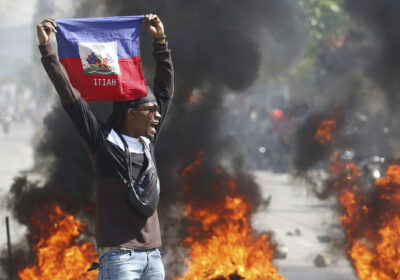
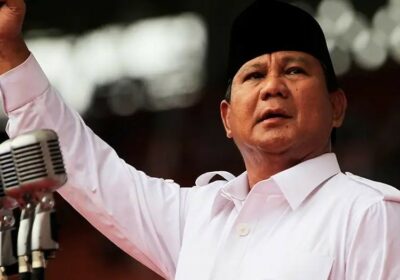
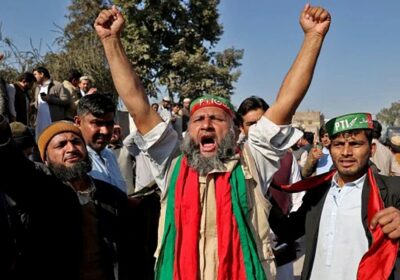
Добавить комментарий